# How one quiet Illinois college town became the symbol of abortion rights in America
CARBONDALE, Ill. – The 26-year-old had never heard of the distant southern Illinois town, but it had become the closest option.
So she cobbled together money. Found child care. Asked her brother for a ride. And set off early one morning to drive north across state lines to 22,000-person Carbondale.
It was a nearly seven-hour round trip from her home in Tennessee. Long enough for the decision to rattle in her head as the flat Midwestern landscape slipped by the car windows.
No, she told herself. I thought it out. It's not the right moment to have a child.
She was already raising two young children. She had split with her boyfriend. She was financially unstable from losing a job. And she could face health risks.
She finally tried to go to sleep.
They crossed into Illinois.
From there it was another hour’s drive to the outskirts of Carbondale, a place often reached by a two-lane state highway that winds by farm fields and churches or a busier route dotted with fast food, strip malls and a building on which, for a time, hung a banner reading, “Pro Life. Pro God. Pro Gun. Pro Trump.”
Mostly rural, conservative southern Illinois was an unexpected place for an abortion clinic, the 26-year-old thought, even if the town’s welcome sign noted it was home to Southern Illinois University.
They parked outside a single-story office building, across from a Kroger, at the Choices Center for Reproductive Health. She walked in past a security guard to a waiting room, donning a green wristband.
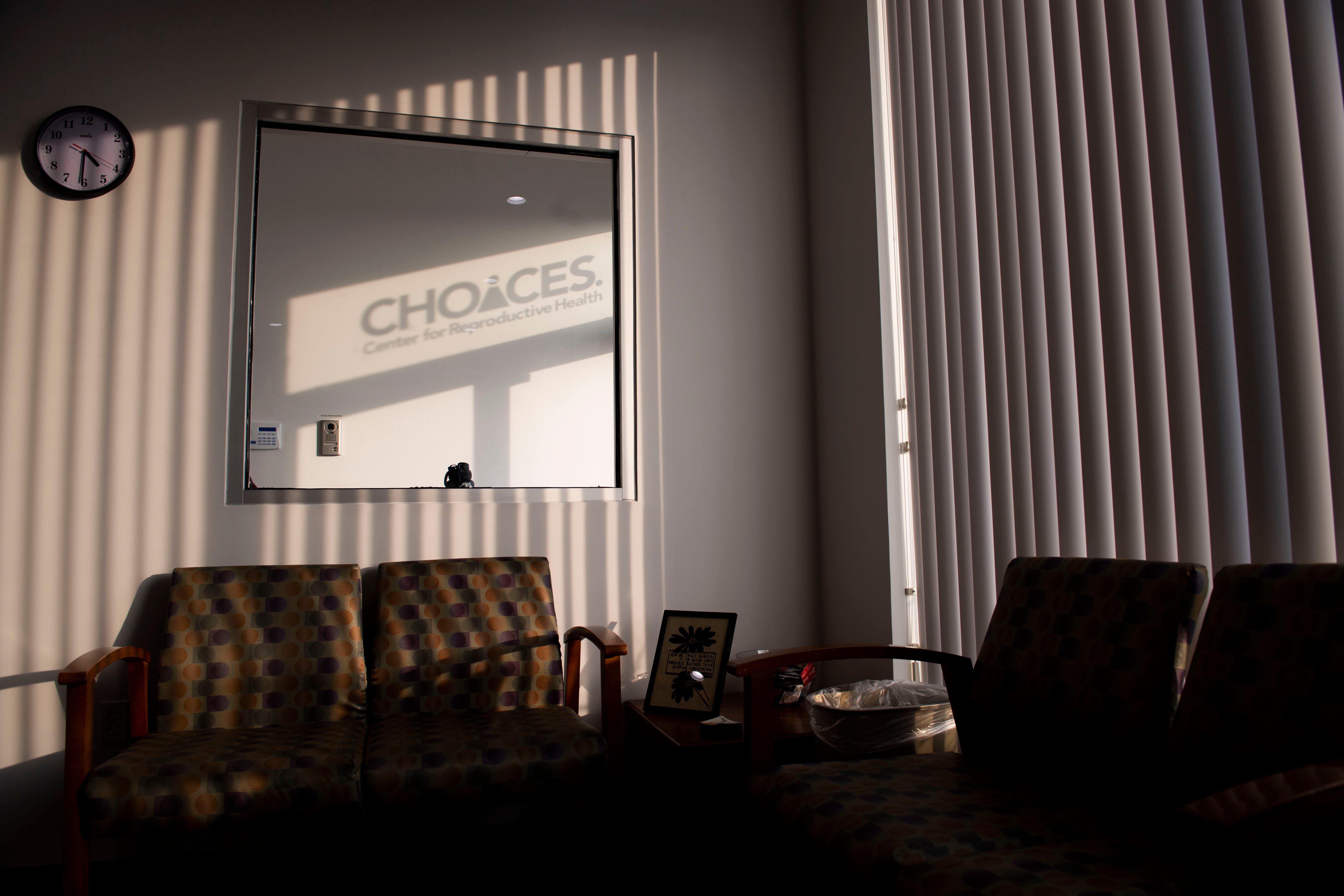
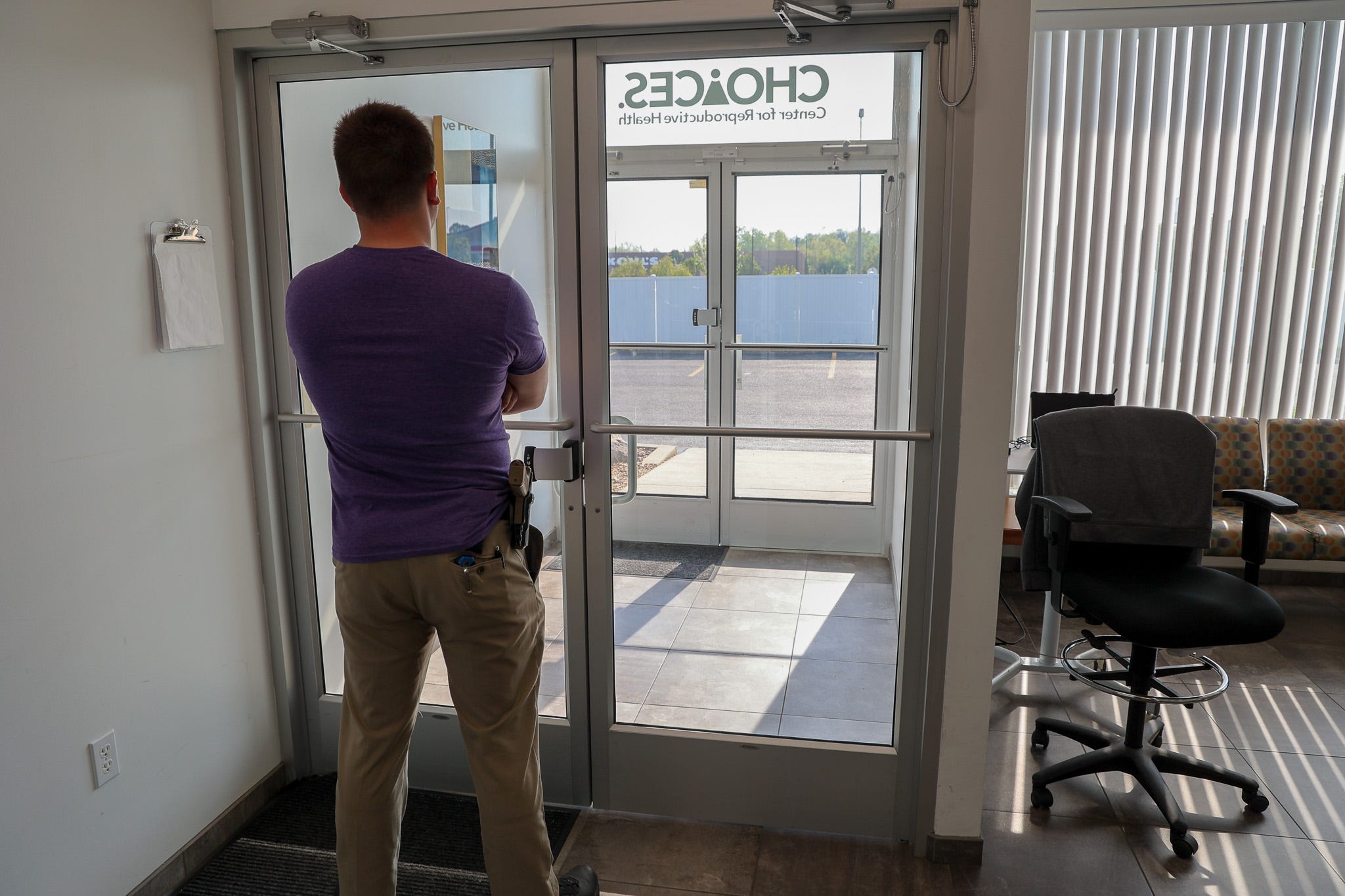
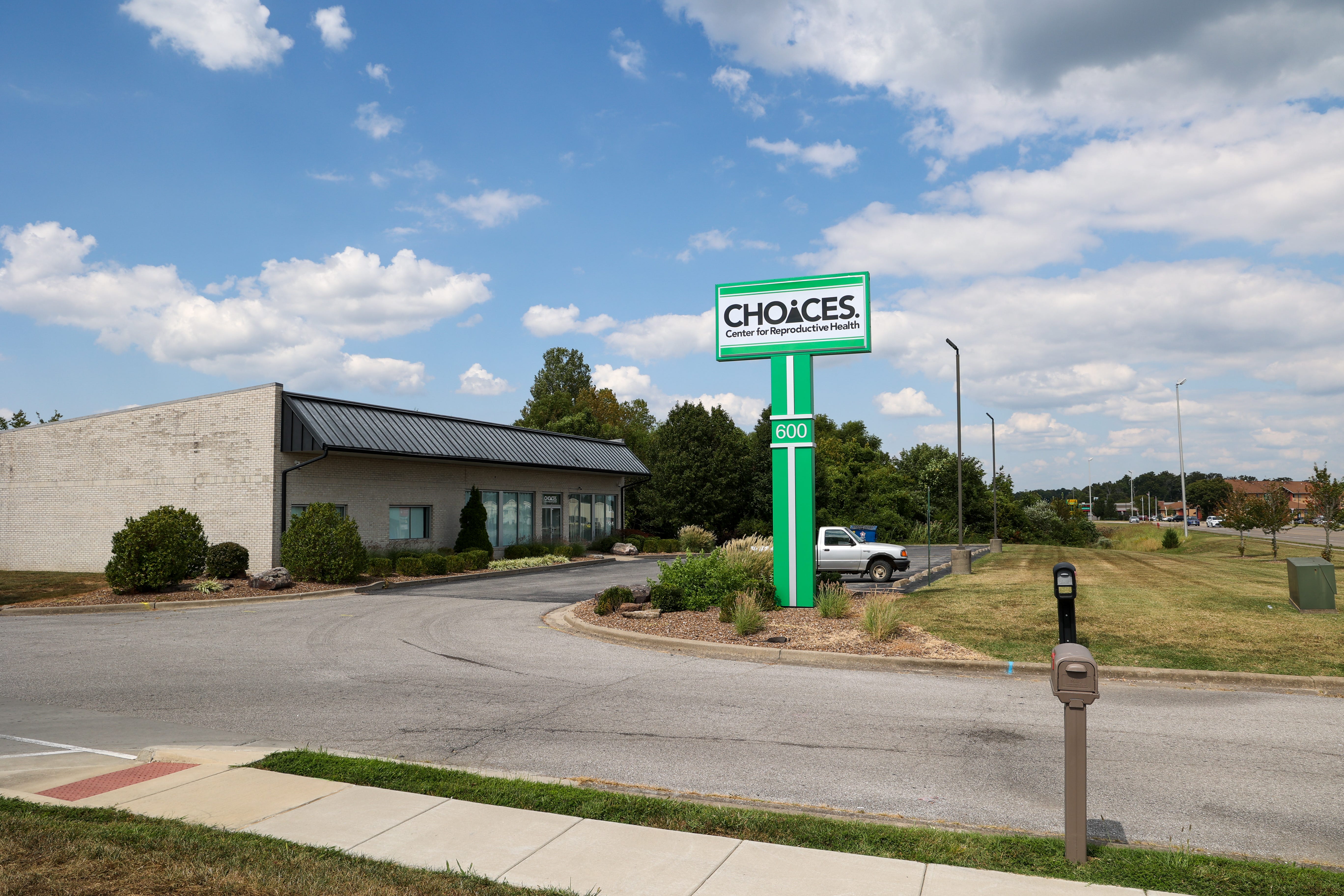
When it became clear Roe v. Wade would be overturned, Choices Center for Reproductive Health looked to move abortion services from Memphis to Carbondale, Illinois, where abortion would remain legal. Choices braced for expected anti-abortion demonstrations and hired a security guard.
TOP AND ABOVE LEFT: NICOLE HESTER, THE TENNESSEAN/USA TODAY NETWORK; ABOVE RIGHT: CHRIS KENNING, USA TODAY
Outside, a staffer put a mark on a whiteboard grid where the center kept track of its days, a row for each of six rooms, a column for each of the four people a patient would wait to see, including a nurse and a medical provider. Once each row was checked off, one patient was done; the next one could begin. Nearby, receptionists scheduled appointments for patients from as far away as Texas and Mississippi.
After medical checks and an explanation of what to expect, the woman with the green wristband lifted a small water bottle and swallowed the first of two pills that would end her pregnancy.
Similar scenes play out each day five miles away, a short drive past the city’s Amtrak station, downtown shops and neon-lit 1950s-era Dairy Queen, on the other side of town. There, at an anodyne medical office where a vinyl sign stuck in the grass reads“Alamo Women’s Clinic,” the parking lot is often filled with out-of-state license plates – women who drive as long as 10 hours from the Deep South for an abortion.
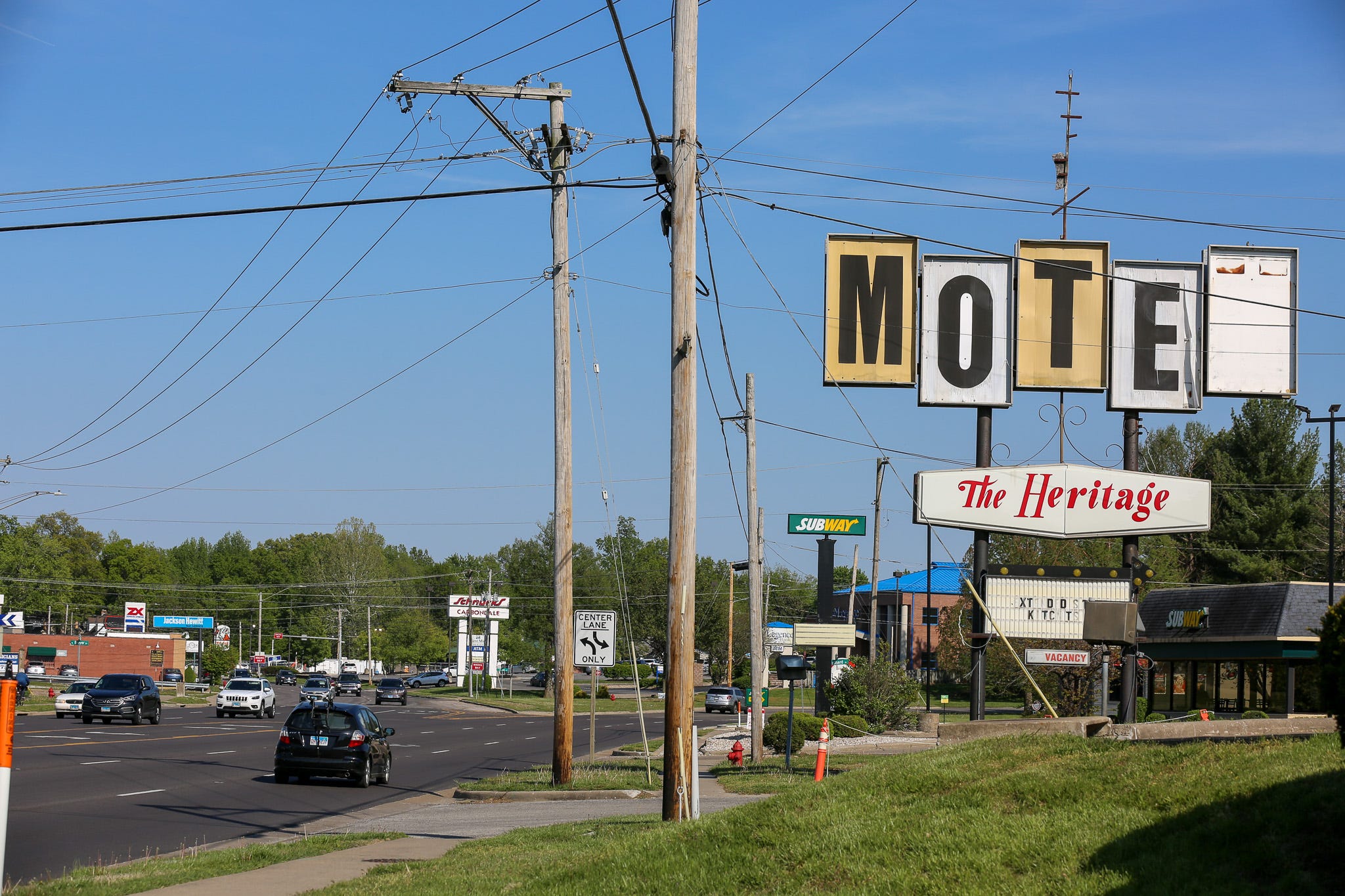
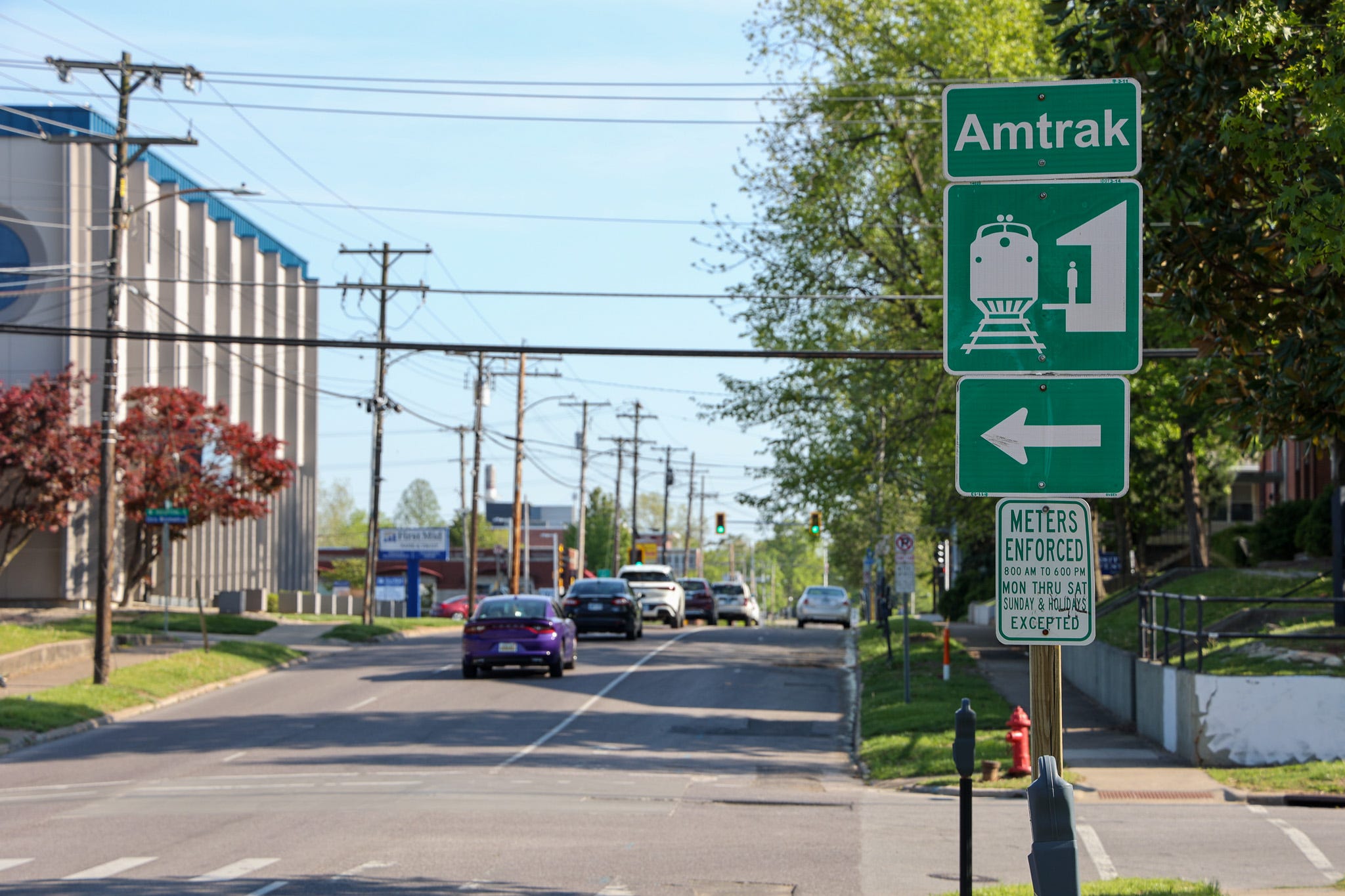
The road into Carbondale is dotted with signs of conservative rural America. At Illinois' far southern end, the city is closer to Mississippi than it is to Chicago. But inside city limits, where a university and a regional medical hub anchor a more left-leaning community, many people welcomed the new clinics.
Chris Kenning, USA TODAY
Outside, on a spring morning, anti-abortion protesters wore orange vests and tote brochures, hoping to persuade arriving women to turn back. A woman drove past them and strode determinedly through the waiting room to the office window. "I have an appointment," she said.
Not far away, just off State Highway 13 near a busy farm supply store, contractors were renovating what some locals expect will soon become Carbondale’s third abortion clinic.
A year ago, there were no clinics in this former coal-country railroad junction turned college town.
In Illinois, anchored by liberal Chicago far to the north, abortion rights were legally protected. But they weren't as much of a local concern.
Abortion clinics operated in towns just across from St. Louis. But elective abortions had not been provided in Carbondale since 1985, when opponents had persuaded the local hospital to halt them.
The Supreme Court’s dismantling of Roe v. Wade changed all that.
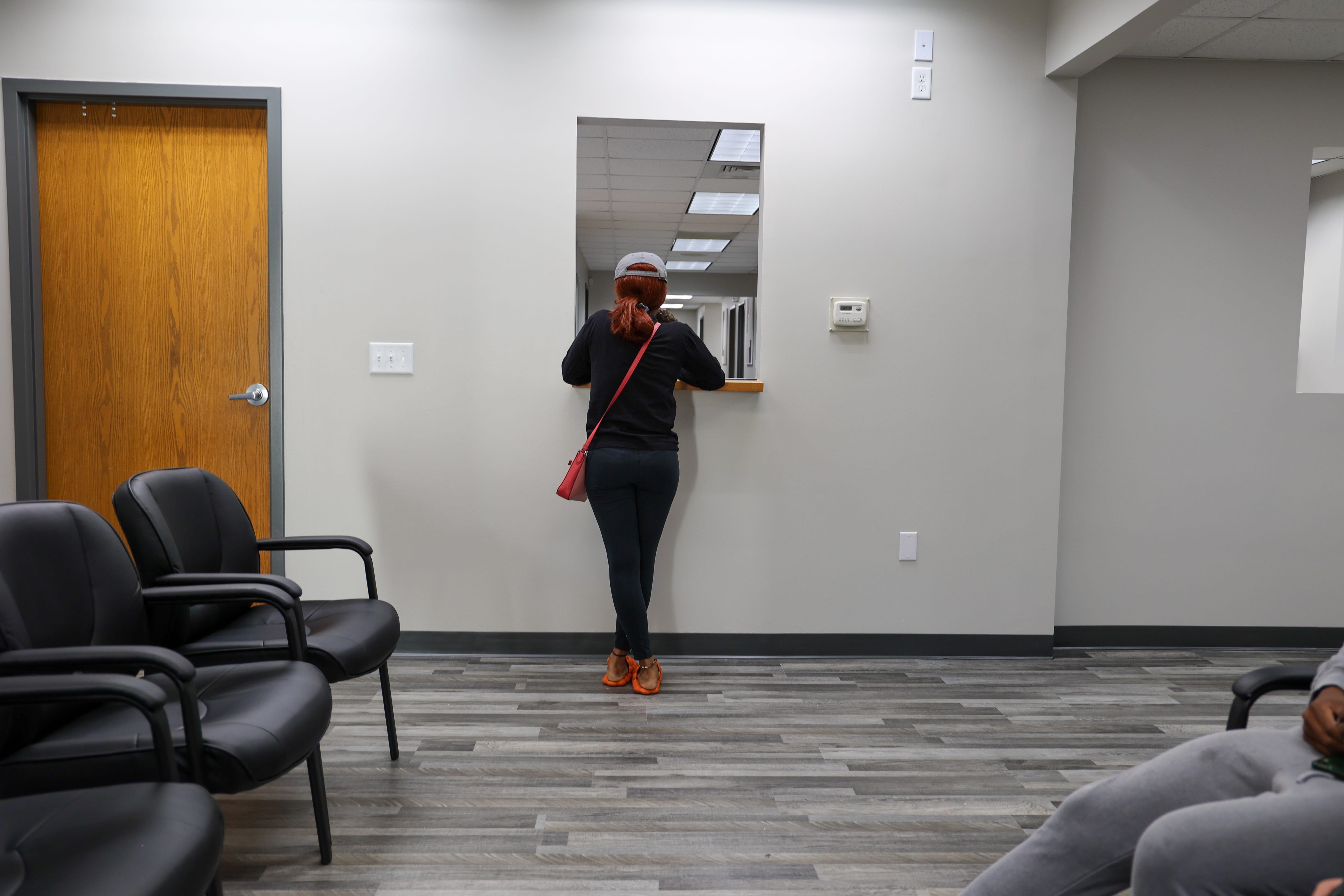
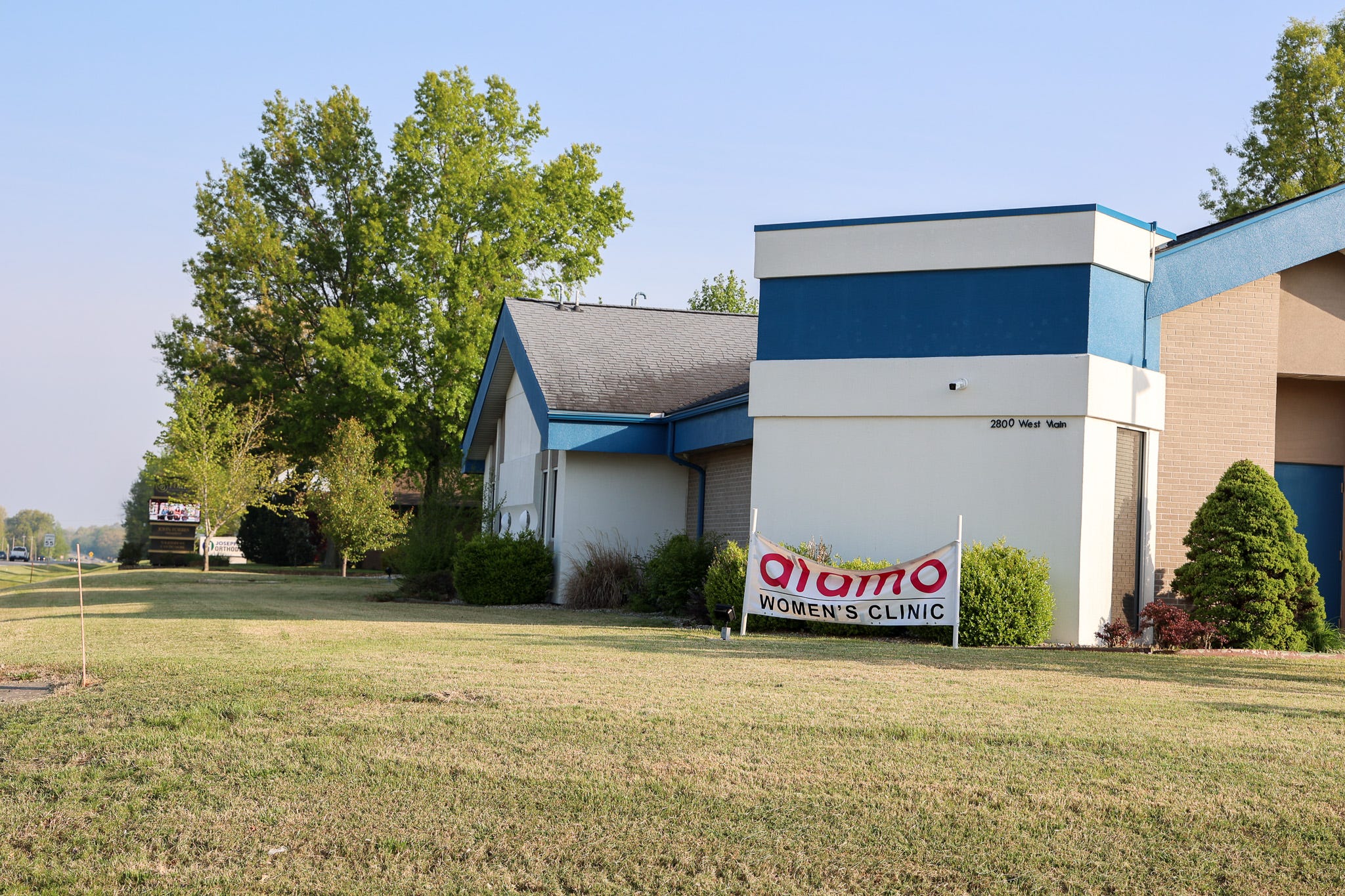
With the changing legal landscape, Alamo Women's Clinic looked to move out of Texas and Oklahoma and reopen in other spots including Carbondale. After some contractors were reluctant to work on the site, the clinic said, it operated without a permanent sign. CHRIS KENNING, USA TODAY
In the year since Roe fell, few places in America have experienced the court’s radical redrawing of abortion access as intimately as some small, blue-state towns near red-state borders. States moved to restrict or ban abortions, and some clinics moved or opened anew in these border towns.
In places like Bristol, Virginia (straddling the Tennessee border), and [Moorhead, Minnesota](https://apnews.com/article/abortion-minnesota-north-dakota-fargo-3ca02dd6ab32139562c0a7857f79b068) (just a bridge away from Fargo, North Dakota), tight-knit communities suddenly found themselves newly split by apost-Roe front line in the battle over abortion: their state line.
And as more states in the Midwest and the South put restrictions in place, abortion providers set their sights on Carbondale.
The city would become the closest abortion destination for more than 1.2 million women from states as far as Louisiana, according to an analysis by Caitlin Myers, an economics professor at Middlebury College who studies abortion access.
Carbondale had long been a blue-dot college town amid deep-red farm country. It had a history of activism dating back to Vietnam. But it had never planned on being the center of anybody’s abortion fight.
In some other year, the city council might have spent most of its time talking about potholes or police budgets.
Gary Williams, Carbondale city manager
> We never imagined we would be in the middle of this national, highly polarized policy issue.
A year ago, the story of how Carbondale would grapple with its new place on the fault-lines of America’s post-Roe landscape was just beginning to unfold.
Providers would have to move clinics and, in some cases, themselves. Could they serve the crush of women who had never heard of Carbondale – but soon would?
Could opponents turn clients, or clinics, away?
Would their opening bring disruptive protests? A glaring national media spotlight? Would tensions become a permanent presence? Would it change the area’s identity?
The stakes, for everyone, felt enormous.
“Everybody’s about to zone in on Carbondale,” Chastity Mays, a resident and mother of three, recalled thinking a year ago as she watched people she knew from her kids’gymnastics and judo classes expressing clashing positions in a contentious meeting before any of the clinics had arrived.
“And I‘m just thinking, ‘Are people ready for this?'”
The busy diner was loud with chatter as waiters wove around full tables carrying hot coffee and plates of eggs.
Sitting at one of the tables was Jennifer Pepper, in her early 40s, with bangs, tattoos of a lightning bolt and a heart on her fingers and a shirt emblazoned with the logo of the clinic she leads – Choices Center for Reproductive Health.
A waiter came up to pour coffee, glancing at her shirt and around the cafe.
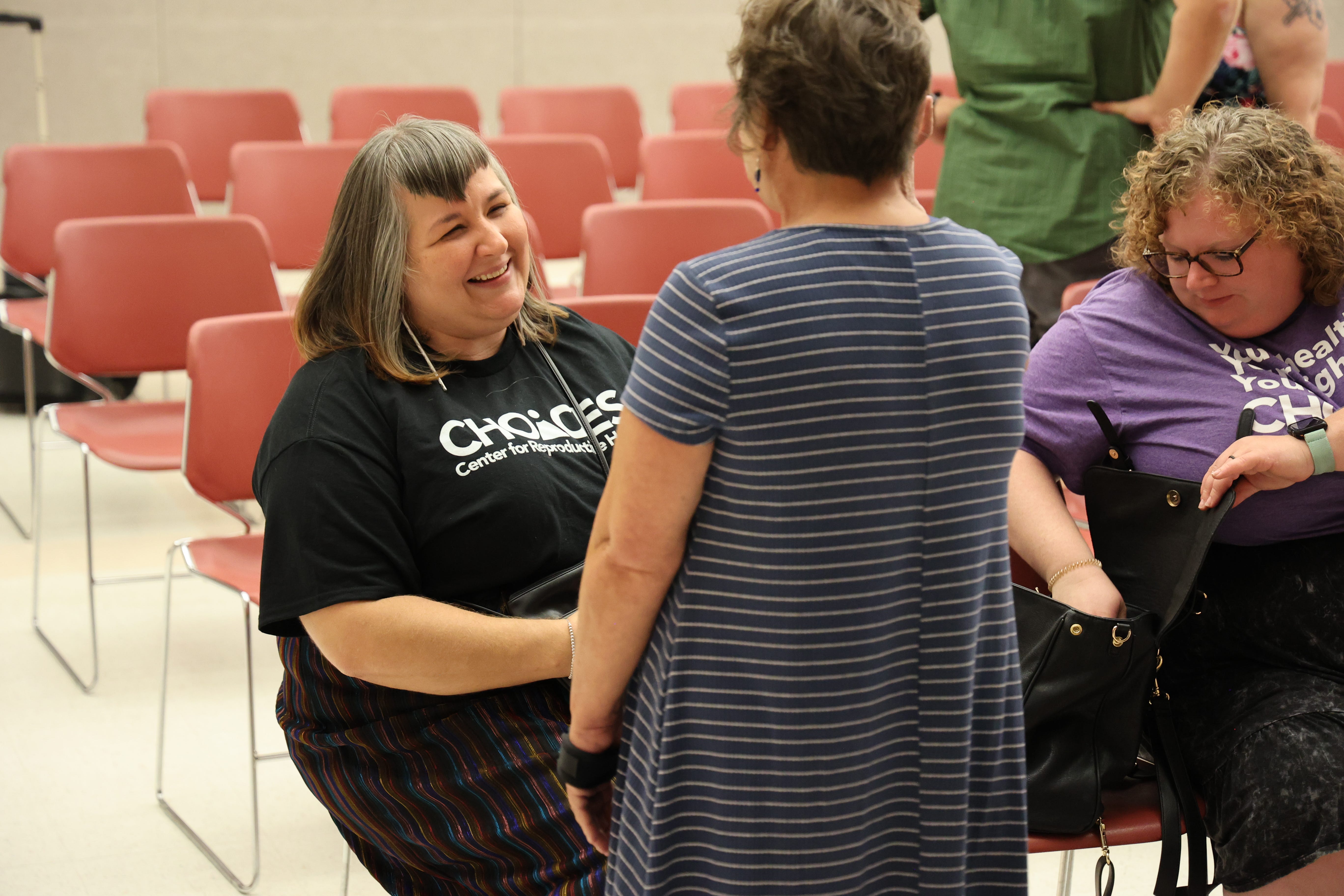
Jennifer Pepper of Choices Center for Reproductive Health began looking at Carbondale even before the Supreme Court overturned abortion rights. She brought her executive staff to visit the town. “I made everybody look me in the eye and said, ‘We're going to do this,'” she recalled. Chris Kenning, USA TODAY
“Are you working at the new place?” he asked, to which Pepper nodded and explained they were hoping to open later in the year.
“Well,” he said, “welcome.”
Pepper, the CEO of Choices in Memphis, Tennessee, had been eyeing Carbondale for a while.
Republican lawmakers in her state and others nearby such as Kentucky and Missouri had for years been passing more and more restrictions, regulations and measures to squeeze access.
In May 2021, when the U.S. Supreme Court decided to hear the case of a Mississippi ban on abortion after 15 weeks — and said it would rule on the constitutionality of all prohibitions on abortion before “viability,” when a fetus can survive outside the womb – Pepper concluded the clock was ticking.
She figured she had little more than a year before the conservative-majority court struck down Roe in the case known as Dobbs v. Jackson Women’s Health Organization. That, in turn, would lead Tennessee to enact its “trigger law,” designed to ban abortion as soon as any future Supreme Court ruling made it possible to do so.
While Choices would continue to provide a range of other women’s health services in Memphis, Pepper had to find a new place to provide abortions. Her clinic had performed roughly 4,000 a year.
But where?
Illinois, whose Democratic-controlled legislature enshrined abortion rights in 2019, was already a destination for clients forced to seek care elsewhere because of restrictions in conservative states.
Pepper looked at a map, seeing clinics across the river from St. Louis, set up to maintain access amid growing restrictions in Missouri, that were already getting a crush of out-of-state patients.
“How much farther south could I get?” she asked.
Pepper knew the area. She grew up in the Rust Belt Mississippi River town of Alton, Illinois. Her eyes quickly fell on Carbondale, founded as a railroad junction in the 1850s. The presence of Southern Illinois University’s campus had long made it a Democratic-leaning outlier in the region – a blue college town inside a red rural swath inside a blue state.
The town, dotted with churches, hadn’t provided abortions for a generation. Still, it was home to athriving LGBTQ community center, and voters there – unlike in many counties in the area – chose Joe Biden over Donald Trump in 2020.
In Texas, even before Roe was overturned, more than 40 towns prohibited abortion services inside city limits, an approach that [spread to other politically conservative towns](https://apnews.com/article/abortion-clinic-border-virginia-tennessee-bristol-7dfed02251e668fdded6ac97ae7fd281) in states such as Iowa, New Mexico and Ohio.
But she figured Carbondale would be a welcoming place with support from leaders and volunteers. And unlike other smaller options even closer to the Illinois border, it had a local police force to quickly respond to trouble and was already a regional medical hub.
Most important, though, was the location. Wedged between states likely to limit or ban abortion, it was in a spot where the Ohio and Mississippi rivers dipped the Illinois border toward the American south. Carbondale was closer to Tupelo, Mississippi, and Huntsville, Alabama, than it was to Chicago.
That could make it a key outpost for abortion rights in a part of the country where an “abortion desert” was about to spread.
In November 2021, six months before word of the impending Supreme Court ruling first leaked out, Pepper visited Carbondale to meet with advocates, civic leaders and others.
Soon she pitched the location to supporters and donors – some of whom were initially skeptical that five decades of the federal right to abortion would just disappear. “Don't you think this is ‘Chicken Little, the sky is falling?’” they would ask her. “And I was like, no.”
Many also hadn’t heard of Carbondale.
“How far is that?” they would ask, as Pepper heard the clack-clack-clack of keyboards typing in the name to look it up on a map.
It’s only three hours from Memphis, she’d reply. It was even on an Amtrak line that ran to New Orleans.
In January, she brought her executive staff to town. “It was like the exit row of an airplane,” she said. “I made everybody look me in the eye and said, ‘We're going to do this.’”
Pepper knew things were about to get so stressful and time-consuming that she and her husband “preemptively started couples therapy, just like, to be sure that this would not ruin our marriage,” she said. Pepper's mother worried that photos of her in online news stories about abortion rights could put her at risk.
In the months that followed, Pepper clocked thousands of miles in her Honda Accord between Memphis and Carbondale, quietly identifying a former dermatologist’s office they would later buy. It sat on a busy commercial strip, across from a large grocery store, next to a burger restaurant and a half-mile from Carbondale Community High School.
In what often felt like blind dates, she met with supporters who might help with housing or volunteer as clinic escorts. Grassroots abortion funds could help women pay for travel and other expenses.
By early March, she was meeting with local government and law enforcement.
Police officials peppered them with questions: How many protesters would there be? How many officers would it take? Would there be safety concerns for staff, patients and the community? FBI agents came and toured their site.
Many asked: Why Carbondale?
“We would take an iPad and show people the map: ‘You’re this blue in the middle of all of this,” she said, showing the red states expected to enact post-Roe abortion bans and restrictions: Missouri. Arkansas. Kentucky. Tennessee. Mississippi. Louisiana. Texas.
And southern Illinois was farther south than practically the entire state of Kentucky.
“‘This is why you’re going to be important,’” she would say to people in Carbondale.
And she’d hear the response: “Oh, that’s going to be a lot of people.”
Carbondale City Council member Adam Loos, a lawyer whose father worked in coal before the industry dried up, had watched the region outside the city, like other parts of rural America, turn from union blue to Trump-country red.
Sitting in a Mexican restaurant, near the railroad tracks that shoot through on their way from New Orleans to Chicago, Loos noted that polls showed a majority of Americans favored some level of abortion access.
Inside the city limits, he said, most people would probably welcome the clinics.
Outside the city? That was another story.
Mississippi’s stretched health system deals with thousands more births after abortion ban
The rumors had begun to spread over kitchen tables, across church pews and through campus offices.
In May 2022, the news finally burst into the open.
An overflow crowd estimated at more than 150, most of them opponents who had learned of Choices’ plan to open in Carbondale, poured one night into the normally sleepy city council chambers.
It marked the second time that month that speakers lined up for a chance at the podium. Two weeks earlier, speakers included one local church leader who said he had more than 50 families who opposed the arrival of an abortion clinic. Another said he didn't want one of America's most contentious culture war battles in their city.
This time, before a far larger audience, another minister – Phil Nelson, a pastor at Lakeland Baptist Church – warned of a “judgment that will come to our city” along with abortion. One elected official from another county urged the council to pass a resolution opposing abortion, as his county had.
Some welcomed the clinics, citing the dangers of maternal mortality rates they said are particularly high among Black women. But critics promised to boycott the city, which they hinted was struggling with falling college enrollment and some closed downtown storefronts.
"A lot of us shop here. A lot of us have family here. Anything that happens here in Carbondale is going to affect the respective communities," a woman who said she worked as a nurse told the council. "I’m going to boycott Carbondale if you guys bring an abortion clinic here."
Then-Mayor Mike Henry at one point waved a paper with a legal opinion, explaining that, under state law, there was nothing they could do to allow the clinic or stop it, in part because it was in an area zoned for medical use.
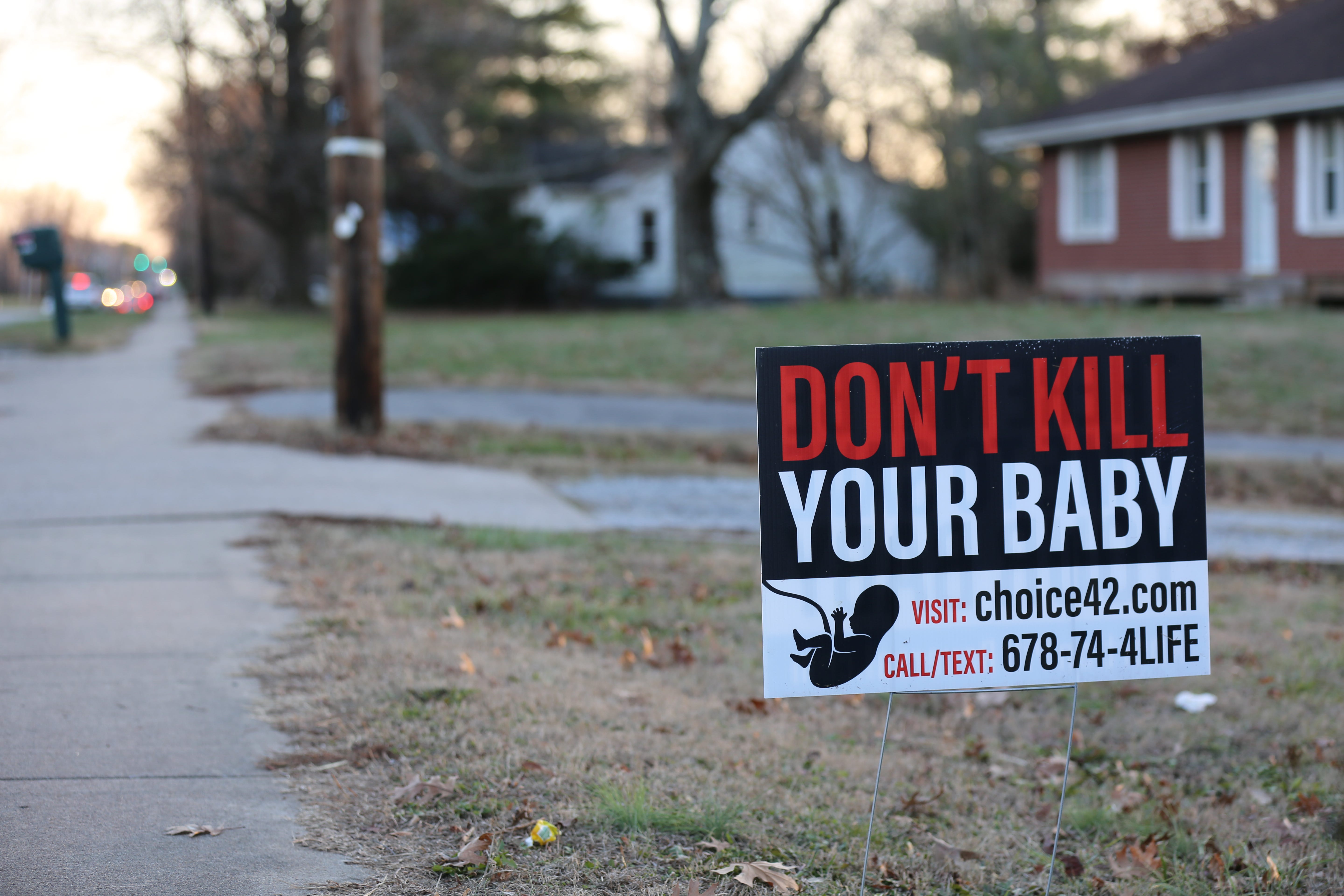
A lawn sign in December 2022. In Carbondale, not everyone was ready to welcome the clinics – or the city's new reputation. Chris Kenning, USA TODAY
“I’m not overly fond of it myself,” he said. “You folks can demonstrate and maybe they won't come here if they understand that the community is truly, truly against them.”
Some clinic supporters believed most of the opponents were from out of town and had little right to demand that Carbondale block the clinics.
Loos, who supported the move, pushed back – at one point telling opponents they represented a “radical” minority driven by religious views. “I guess we might call this Y’all Qaida," he said.
After a night of tense exchanges, opponents shuffled out, vowing to do what they could to stop abortions. Supporters, meantime, discussed volunteering to help.
By then, a second clinic – Alamo Women’s Clinic – was already focusing on Carbondale. In Texas, Dr. Alan Braid, a longtime abortion rights advocate, would also seek to move clinics in San Antonio and Tulsa, Oklahoma, to New Mexico and Illinois.
Some Carbondale-area abortion opponents, while happy that the leaked Supreme Court opinion appeared to signal a pending win in a 50-year fight to overturn Roe, were dismayed that the battle had wound up right on their doorstep.
“It just made things absolutely worse for where I live,” the Rev. Mark Surburg, a pastor in a nearby town, said later, lamenting that the city would become known as the “death capital of the Midwest.”
Pepper was visiting her mother in her hometown of Alton, working at the city's only coffee shop, when her phone started pinging and buzzing.
It was June 24. The Supreme Court ruling finally hit.
She expected it. But it was still staggering.
"I gathered my stuff up very hurriedly, jumped in the car and drove to Memphis," she said, spending the drive juggling calls from staff and attorneys about what was next.
By the time she arrived at the clinic, more than 5,000 calls had poured in, crashing the phone system – all women scrambling for appointments or asking where they could go.
OK, she thought, here we go. This is finally it. Her efforts to open a new location had been months in the making. But plenty of challenges remained.
For one thing, Pepper wondered if she’d struggle to hire staff in a small town – one where a secret about where you work would be hard to keep.
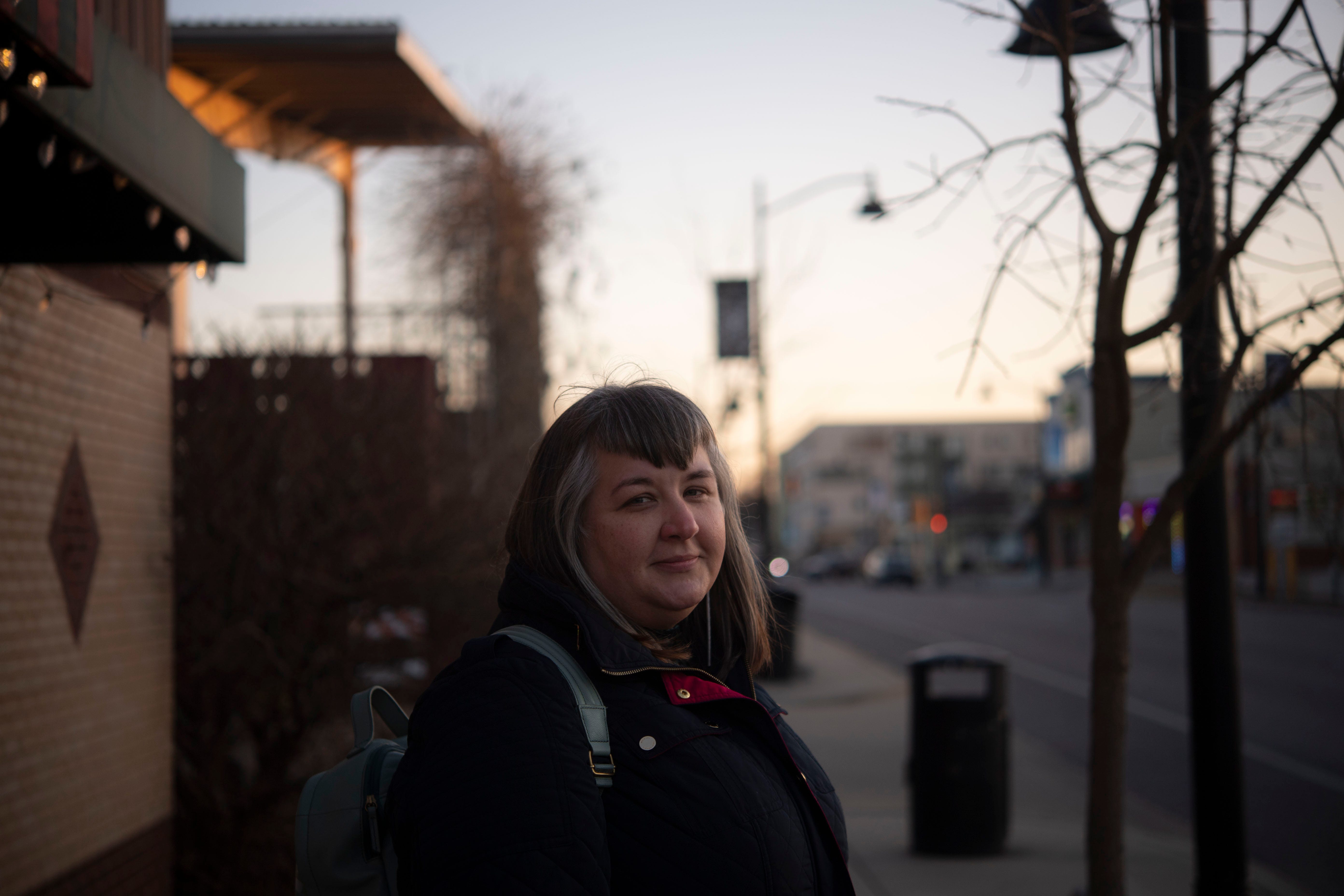
Jennifer Pepper worried she would struggle to hire staff for the Choices clinic, in a small town where a job would be a hard secret to keep. Instead, she found that some people wanted to be part of a historic moment. Nicole Hester, The Tennessean/ USA TODAY Network
But the prospect of thousands of women who'd soon be unable to get abortions in their home states helped draw staff to the clinics from near and far in the months after the ruling.
There was the 36-year-old transplant to Carbondale named Unique, who like others didn’t want to use her last name to protect her safety. After moving from Boston for her husband’s medical position, she signed on as Choices’ operations manager.
“This is a historic moment,” she said. “I want to be a part of it.”
There was the nurse practitioner with a streak of colored hair who moved from Chicago. The medical assistant with a child who had grown up in an even smaller southern Illinois town. The local resident drawn by the chance to make a difference.
“Initially we all had these worries: How will it be? How are the protesters going to react to us?” Unique said.
Unique’s husband was initially uneasy. The clinics were the talk of the town. “It was a big thing,” she said. The fact that Choices also planned to offer transgender care, along with a wide range of women's health care, only added to the potential for controversy.
One Choices employee said she kept it quiet, afraid that her relative’s business would suffer if people learned where she worked. Another wondered how her church would react. Doctors would have to come in from outside the area.
Across town at Alamo, which [announced](https://www.washingtonpost.com/politics/2022/07/13/abortion-roe-texas-illinois-new-mexico-alan-braid/) its new location in July, Braid’s daughter, Andrea Gallegos, the administrator of the clinics in Tulsa and San Antonio, had decided to move her family 14 hours north to Carbondale.
“We’re essentially in the same position that patients are – having to make the choice to travel,” she said, wondering if she’d run into protesters in town after work, something she didn’t experience in a city of more than a million.
“Will I see them on the corner at the clinic and then also later at the school picking up my children?” she said. “Will I see them at the grocery store?”
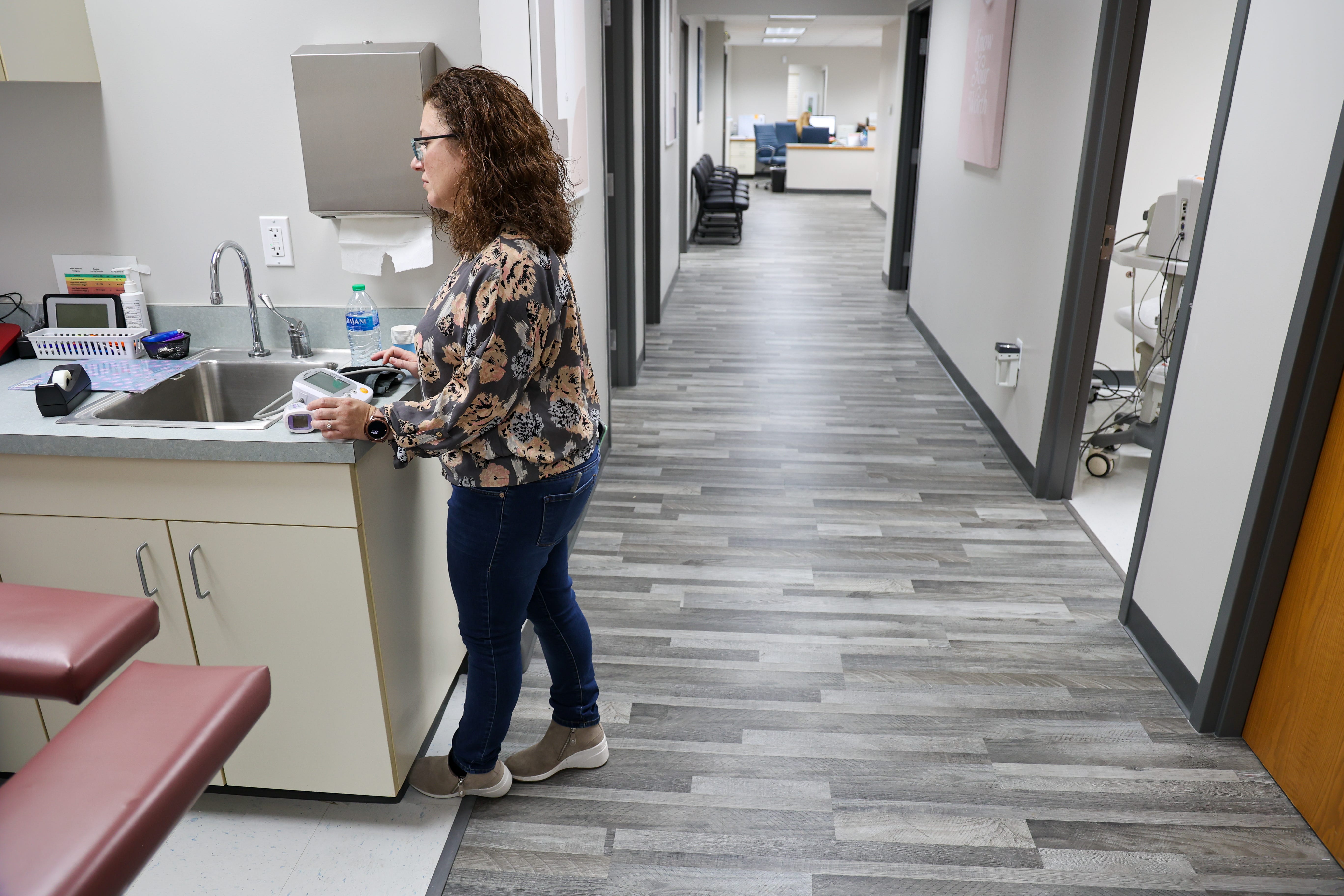
Andrea Gallegos, administrator of the Alamo clinic, decided to move to 14 hours away to open the clinic in Carbondale in hopes of serving women traveling for abortions. “We're essentially in the same position that patients are," she said. Chris Kenning, USA TODAY
At Choices, staff were trained on “clinic invasions,” active shooters and how to scrub certain personal information from the internet to avoid targeting or harassment.
Opponents pressured several contractors to boycott them. “Found out what you all do. Take me out, I’m not working for you guys,” Gallegos said one contractor told them. Later, they could not get a sign erected for the same reason.
Still, the clinics began to take shape. They hauled in equipment. Exam tables and copiers arrived. As opening days approached, misgivings began to fade.
Most employees said they were warmly supported around town in their work gear. People thanked them at gas stations and dropped off supportive letters.
“I’ll go to the post office or the grocery store and people will see me in my uniform. And they’ll stop me and be like, ‘Thank you for your work.’ People stop by to offer to volunteer,” Unique said. “I honestly didn’t expect to have that much support. But we do. And it’s a really good feeling.”
By August, a group of pastors from Carbondale and surrounding southern Illinois counties had begun to meet along with opposition groups from the St. Louis area.
News of the clinics’ plans to open in Carbondale had landed like “a punch in the gut,” said Surburg, head of the Good Shepherd Lutheran Church in the residential neighborhood of Marion, 17 miles east of Carbondale.
Now there was a challenge ahead.
For decades, there had been little for anti-abortion opponents to organize against in the area. Active opponents thought of praying or working as so-called sidewalk counselors outside of abortion clinics as a “St. Louis thing,” the biggest city several hours away.
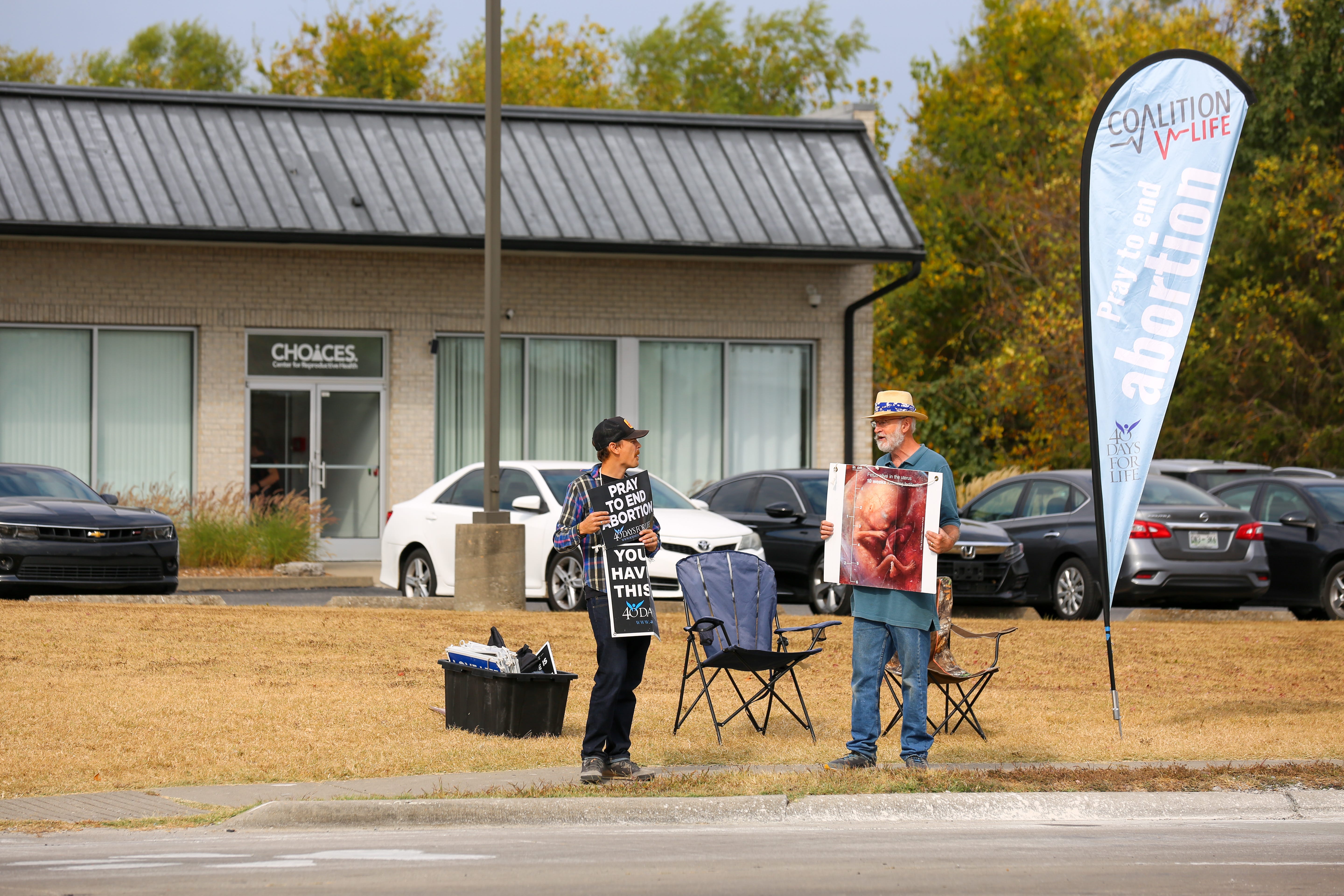
Before the Dobbs ruling, there were no abortion clinics to protest in Carbondale. But once the clinics arrived, a group of pastors and others vowed to build up an opposition movement. Chris Kenning, USA TODAY
Carbondale did have a small pregnancy center, which offered aid to mothers and sought to offer alternatives to abortions. But many churches weren’t connected or organized around abortion, Surburg said.
He and others wanted a regular, peaceful presence outside the clinics. A big city might easily field a regular crowd of demonstrators. But a town of fewer than 22,000 – and a liberal-leaning one at that?
“We’re going to have to build it up by scratch,” Surburg said.
Brian Westbrook, director of the St. Louis-based nonprofit Coalition Life
> The abortion industry is pouring millions of dollars now into Carbondale. And so the pro-life movement wants to do the same.
In other cities where clinics had crossed state lines, opponents had employed new tactics, including city-specific campaigns of door-knocking and, in more conservative towns, newly constitutional zoning restrictions to keep clinics away. In Carbondale, such suggestions went nowhere.
Helping organize a response was Brian Westbrook, director of the St. Louis-based nonprofit Coalition Life.
Westbrook discussed erecting billboards and signs on highways leading to Carbondale and funding an expansion of the local anti-abortion pregnancy center. It had expanded hours and ultrasounds, director Cassie Walden said during an August webcast called “Carbondale Crisis.” There was talk of a mobile ultrasound unit parked near the clinics to get women to rethink abortions.
“The abortion industry is pouring millions of dollars now into Carbondale. And so the pro-life movement wants to do the same,” Westbrook said.
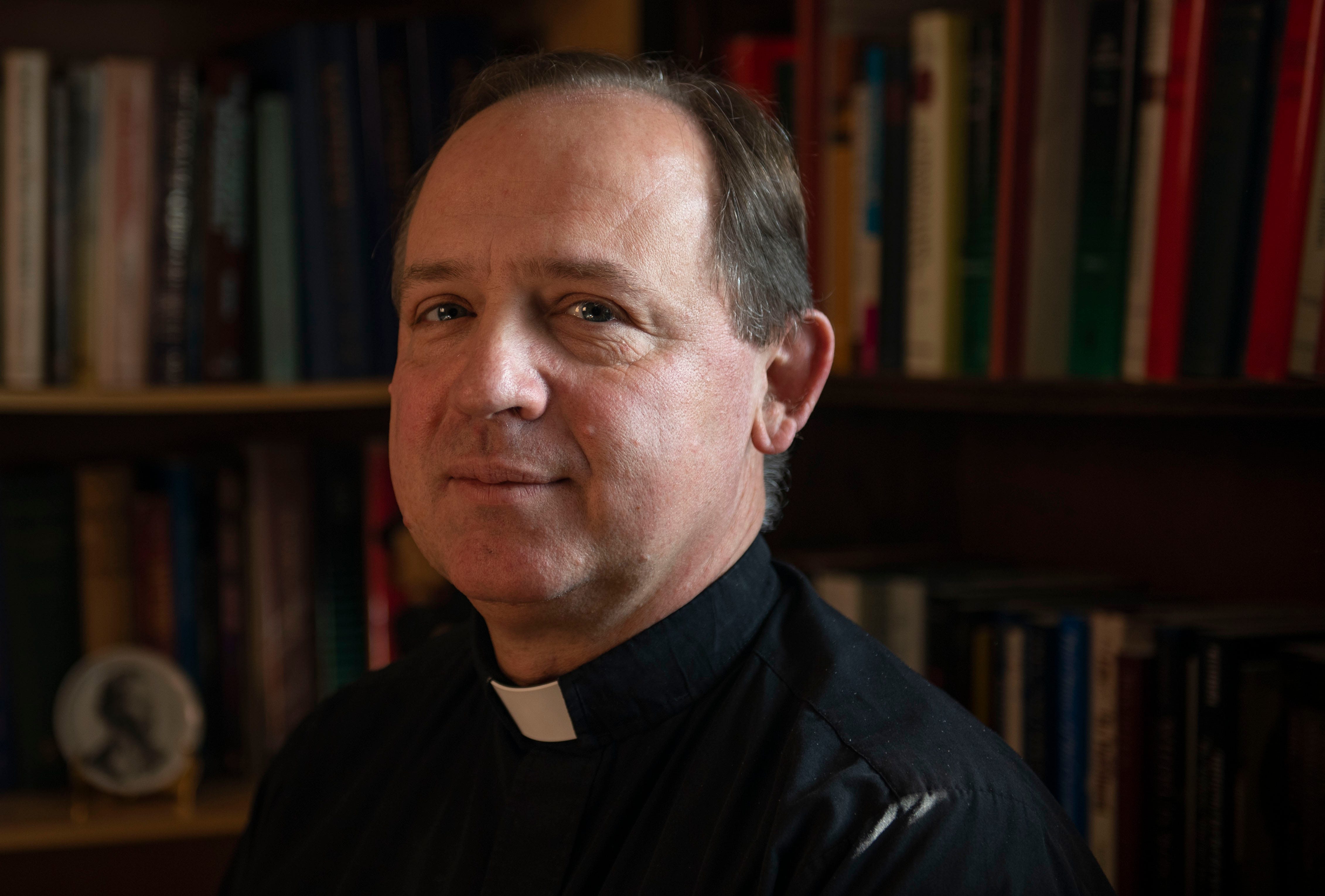
After the fight to overturn Roe v. Wade, Rev. Mark Surburg, a pastor in a town near Carbondale, was dismayed to find the battle had wound up on his doorstep. “It just made things absolutely worse for where I live,” he said. NICOLE HESTER, THE TENNESSEAN/USA TODAY NETWORK
Pastors from Kentucky and Tennessee volunteered to make trips to Carbondale and opponents formed the Southern Illinois Pro-Life Alliance, a group of dozens of churches, to coordinate what they said would be a peaceful presence outside the new clinics.
Surburg said some wanted to fund supported living facilities for mothers who didn’t believe they could afford a child.
At that point, just a few months after the Supreme Court ruling, the landscape of abortion remained unsettled as the battle moved to state legislatures, courts and ballot boxes.
Tennessee’s “trigger” law went into [effect](https://www.tennessean.com/story/news/2022/07/26/tennessee-abortion-trigger-law-ban-2022-expected-august/10061093002/) that month, making it a felony to provide abortions, with rare exceptions. At the same time, Kansas voters rejected a [state constitutional amendment](https://www.npr.org/sections/2022-live-primary-election-race-results/2022/08/02/1115317596/kansas-voters-abortion-legal-reject-constitutional-amendment) that would have stripped away abortion protections, reflecting[national polls showing](https://www.pewresearch.org/short-reads/2022/06/13/about-six-in-ten-americans-say-abortion-should-be-legal-in-all-or-most-cases-2/) about 61% believe abortion should be legal in most instances.
But during an appearance on the “Carbondale Crisis” webcast, Republican state Sen. Terri Bryant, who represents a portion of southern Illinois, predicted Illinois would only pursue more permissive abortion laws.
“Everyone in the country is going to want to come here,” she said.
On a sunny fall morning, Gallegos got out of her car and walked up to the Alamo Women’s Clinic, a one-story building set among small medical offices on the corner of a divided state highway.
Trailing her that morning were a cable news camera crew, a wire-service photographer and another reporter. Carbondale was coming to symbolize the shifting map of U.S. abortion access, and the media glare was intensifying.
She kept thinking: Was she forgetting something?
She’d slept little the night before, holed up in one of the few hotels downtown, chasing down final details. Pushing through the glass door, she sipped a large coffee, both exhausted and excited.
It was far smaller than their San Antonio office, which had surgery suites. There was no sign yet outside announcing the clinic. But it had been a long road to get here.
In 2021, [Texas](https://www.washingtonpost.com/politics/2021/09/01/texas-abortion-law-faq/?itid=lk_inline_manual_11) banned abortion beyond roughly the sixth week of pregnancy, shutting down many of the abortions Alamo performed. They had directed women to their clinic in Oklahoma, a nine-hour drive, before that state, too, passed a ban. A month later, in June, “it was over,” she said.
Finally, she was once again able to serve women seeking care.
“It’s been a long time coming,” she said, walking amid quiet, white-walled hallways decorated with encouraging words such as “know your worth,” and checking on exam rooms and supply closets.
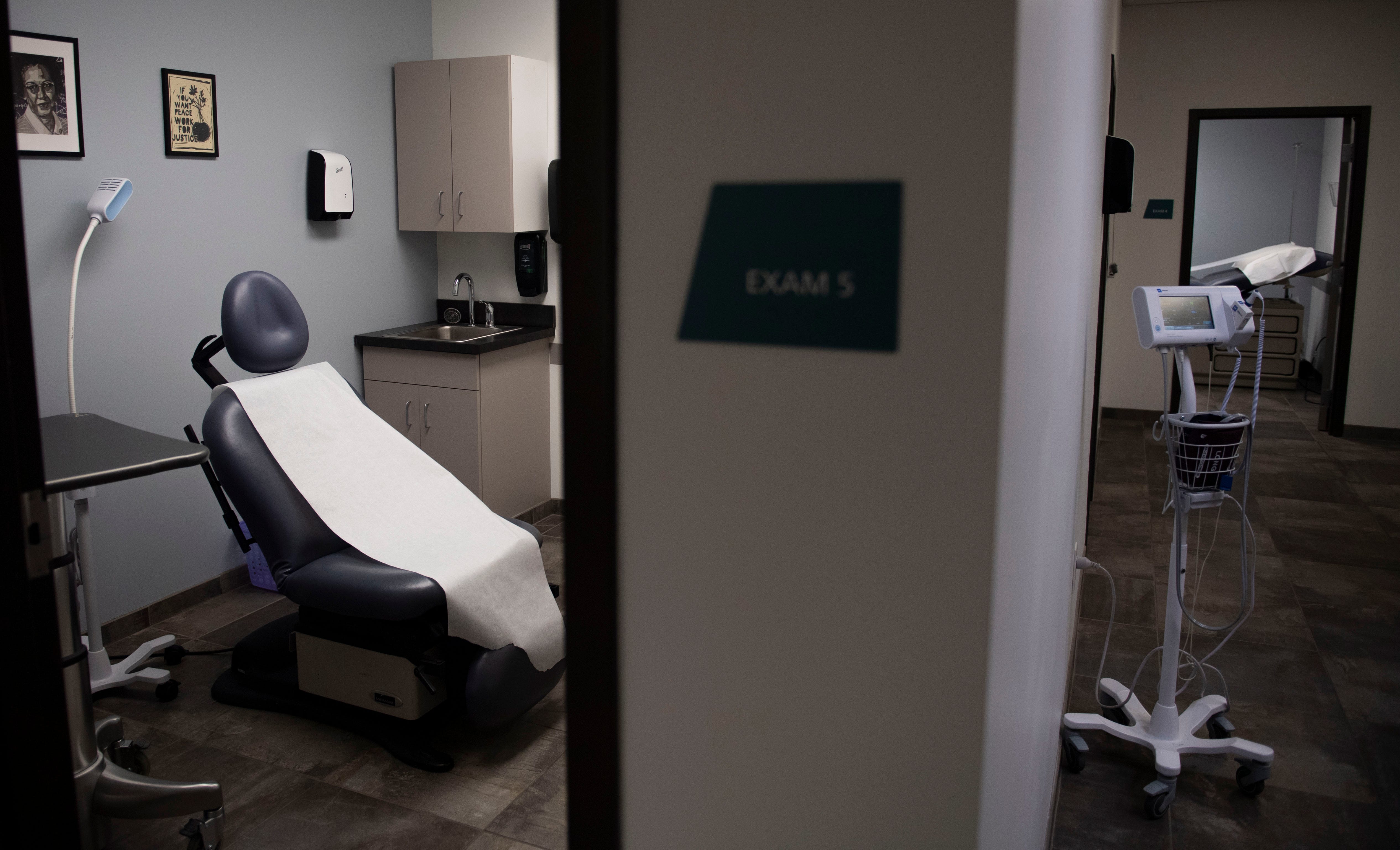
A patient room at Choices Center for Reproductive Health, in December. Nicole Hester, The Tennessean/ USA TODAY Network
A physician, who had driven in from another state, entered and said hello. A calendar on the wall showed the date: Nov. 3, opening day.
By then, more than a dozen states had enacted near-total abortion bans. Arkansas, Louisiana, Mississippi, Oklahoma, Tennessee, Texas – places where women might now look toward Carbondale. And that meant people seeking an abortion had to bridge longer and costlier distances. A [study published in JAMA](https://jamanetwork.com/journals/jama/fullarticle/2798215?utm_campaign=articlePDF&utm_medium=articlePDFlink&utm_source=articlePDF&utm_content=jama.2022.20424) found thattravel time for women in Texas to the nearest abortion facility increased by nearly eight hours.
Waiting lists swelled as providers looked to open clinics and give financial aid to help women cross state borders. Planned Parenthood’s abortion clinic in Fairview Heights, across from St. Louis, saw a 370% increase in patients since the court ruling.
Soon the first woman, in her early 20s, checked in at the window. Her boyfriend sat in the waiting room. It would be $600 to see a provider and get [mifepristone](https://www.nytimes.com/2023/03/08/briefing/abortion-pills.html), the first pill in the two-drug medication abortion regimen that had grown to account for more than half of U.S. pregnancy terminations.
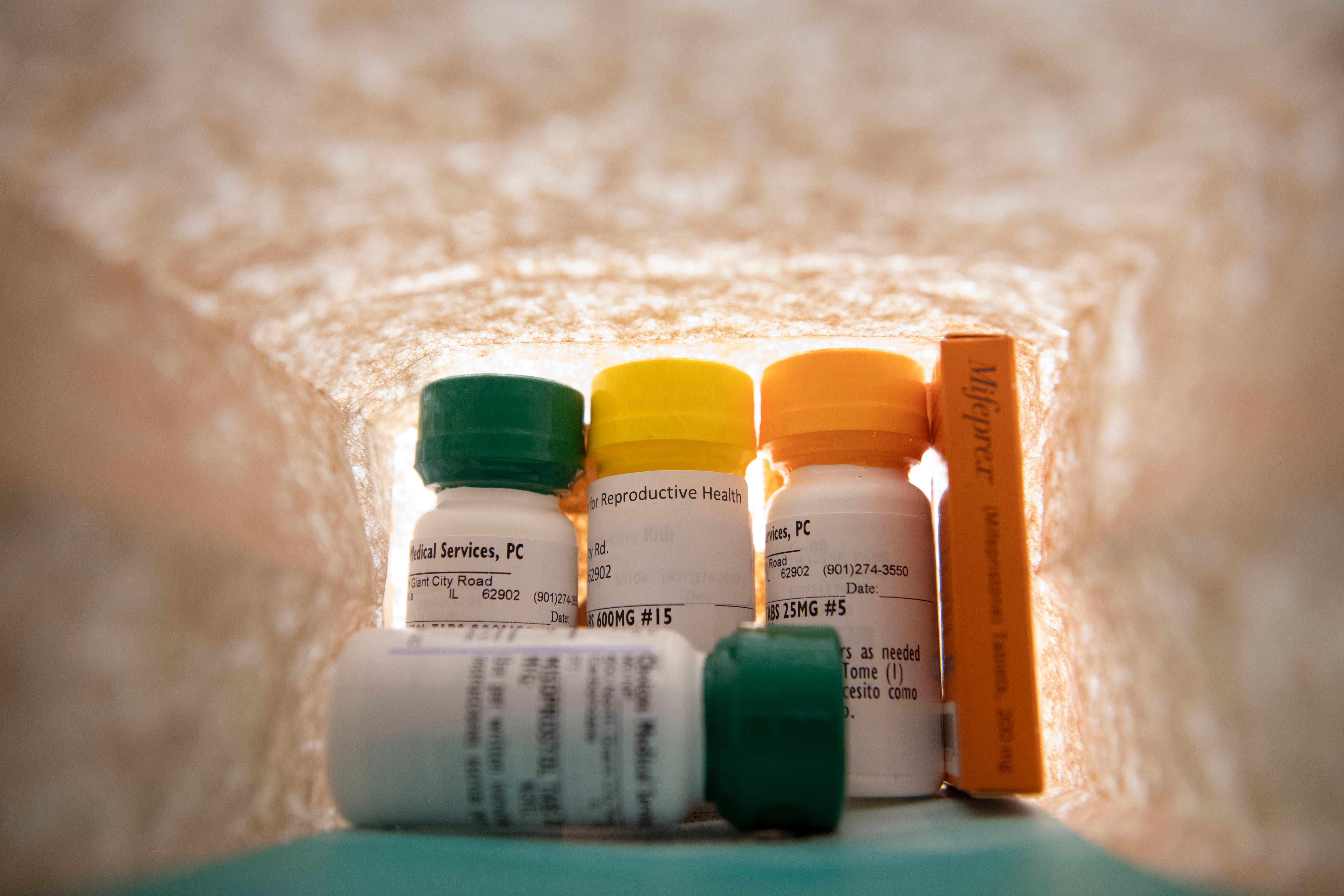
Medication for abortions, at the Choices clinic in Carbondale. More than half of American abortions now use this method. Nicole Hester, The Tennessean/ USA TODAY Network
“Our credit card machine decided not to work,” Gallegos said of a glitch that would require clients to retrieve cash from an ATM.
On hand was Braid, still fighting for access after 45 years. At the time, he was still facing [a lawsuit for performing an abortion](https://www.usatoday.com/story/news/nation/2022/12/09/texas-abortion-ban-judge-alan-braid-sb-8/10865066002/) on a patient who had passed Texas’ six-week legal limit, a move hoping to draw a legal challenge.
Sitting in a clinic office, Braid said the lack of protesters that day was fine with him. He was sure they’d arrive but hoped they would not be as intense as they’d been in Oklahoma.
“In Tulsa, the antis bought an empty lot across the street from the clinic. They put up a cross, a little shelter, a little prayer area. They were out there, 20 people at a time, screaming at patients,” he said. “It was pretty awful.”
Before long, the patient walked back to an exam room. She told staff she had returned from a trip and realized she believed she was pregnant.
After some tests, the doctor who’d arrived from another state pulled up a chair on rolling wheels to the exam table.
“I don’t see a pregnancy yet. You’re very early,” he said. She left without getting an abortion. More tests were needed.
Walking out, the woman said that was grateful to find access near where she was living.
“I’m glad it’s here,” she said.
Already that day, Alamo was setting appointments for people coming from as far away as Texas and Florida.
But first, those women would have to find ways to bridge the distance.
More than a month later, Alison Dreith hunched over her laptop.
Outside her remote Illinois farmhouse, a distant drive from Carbondale – she's careful not to say exactly where – goats grazed on a cold December day. Inside, she scrolled through messages from women across the South: Jasmine from Texas. Kyler from Arkansas. Lesha from Georgia.
They were facing unwanted pregnancies – but needed financial help to reach clinics like Carbondale. Gas money. Airfare. Hotels.
Some tried to explain. They didn’t have someone to care for their other children. They lacked a car or a ride for drives to Carbondale that could take up to 10 hours. They needed help with hotels to stay overnight.
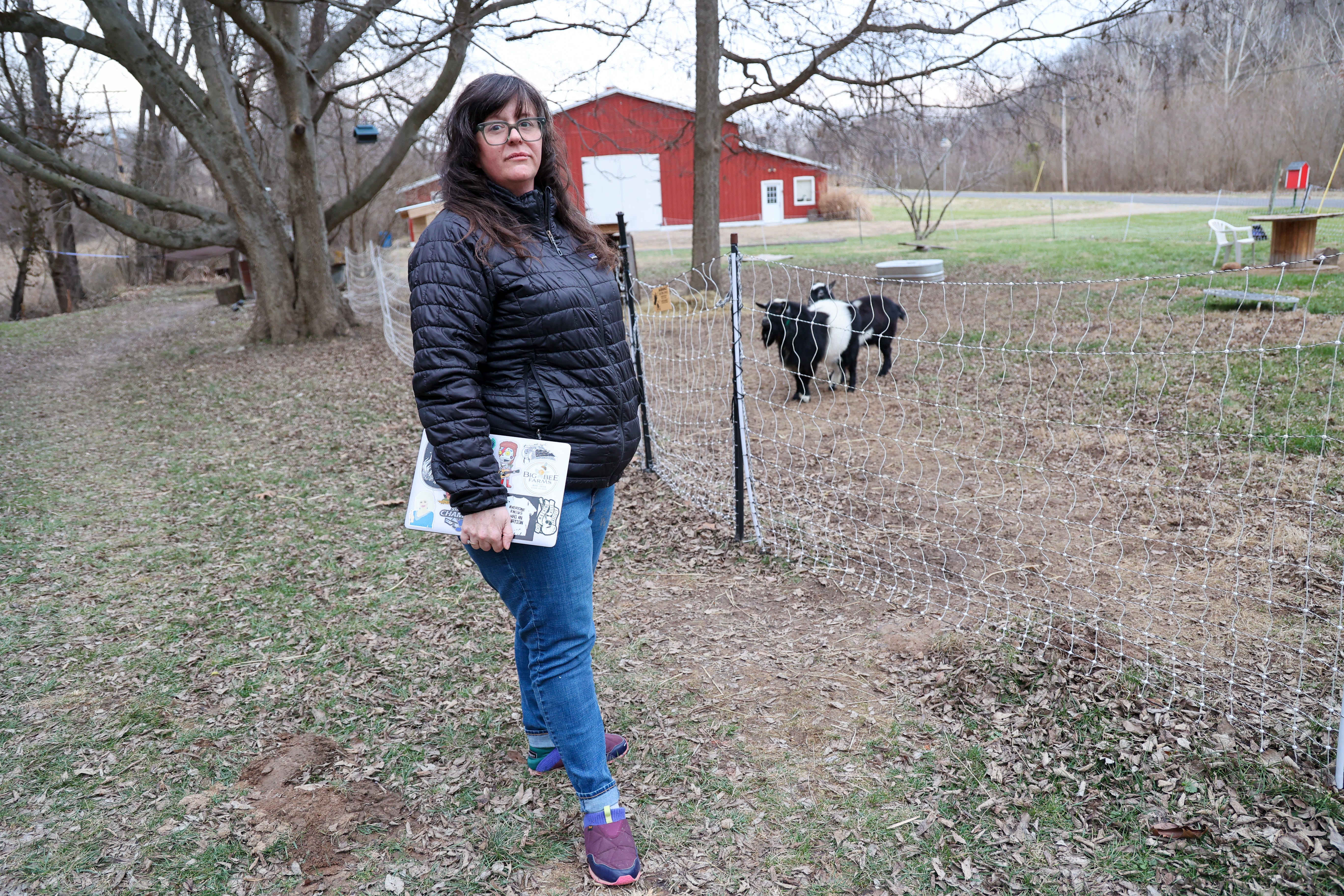
Alison Dreith went to college in Carbondale. Now, from elsewhere in Illinois, she helps run the Midwest Access Coalition, which offers support for women trying to reach clinics in Carbondale, and elsewhere, for an abortion. Chris Kenning, USA TODAY
“I’m looking to receive help with transportation for my upcoming appointment,” one woman messaged.
Dreith, who went to college in Carbondale, helps run the Midwest Access Coalition, a donations-and-grants-funded nonprofit that started in 2015 as state restrictions were already fracturing the abortion landscape.
Now, months after Dobbs, they and other abortion funds were playing an increasingly critical role for women having to travel hundreds of miles to reach clinics. A Planned Parenthood center in Fairview Heights, Illinois, just across the river from St. Louis, had provided travel and lodging to thousands of patients since Dobbs.
Toward the end of 2022, the Midwest Access Coalition helped more than 1,600 women. That was double the number from the previous year and nearly four times the 380 clients they aided in 2019.
Dreith, a former leader of NARAL Pro-Choice Missouri, said on any given day, she has to vault unexpected hurdles on behalf of the women who call: A missed flight. An inability to get off work. A domestic violence victim whose abuser took her identification and phone.
On this day, she was helping a 24-year-old woman in Arkansas who had an appointment at the Alamo clinic in Carbondale. It was 680 miles round trip. $150 gas, $40 food. A room at the Best Western in Carbondale.
“I have sent $190 in cash to the clinic for you to pick up at your appointment for gas and food support,” Dreith messaged. “I’ll call and check in on you next week, but I’m here if you need me or if something changes.”
The woman thanked her. “Happy to help,” Dreith replied, with a hands-heart emoji.
But the demand never stopped.
The group already had to temporarily stop supporting partners to travel with patients. It would eventually have to shut down the hotline during the latter days of some weeks because of the overwhelming demand, waiting until the following week to help those seeking it.
That means some were managing their own abortions or winding up carrying an unwanted, or even dangerous, pregnancy to term.
“It just reminds you that lives are on the line,” she said.
Just a few days before Christmas, a blizzard was forecast to sweep across southern Illinois’ fields and forests.
Outside huddled several protesters, including a local resident who had a sign, a folding chair and a cooler with snacks and two women at their checkpoint sign. One driver raised a middle finger at the protesters as he sped by.
Inside Choices, “Let It Snow” played on speakers as staffers clicked keyboards at a long desk. At one end were paper bags filled with pregnancy-ending medication.
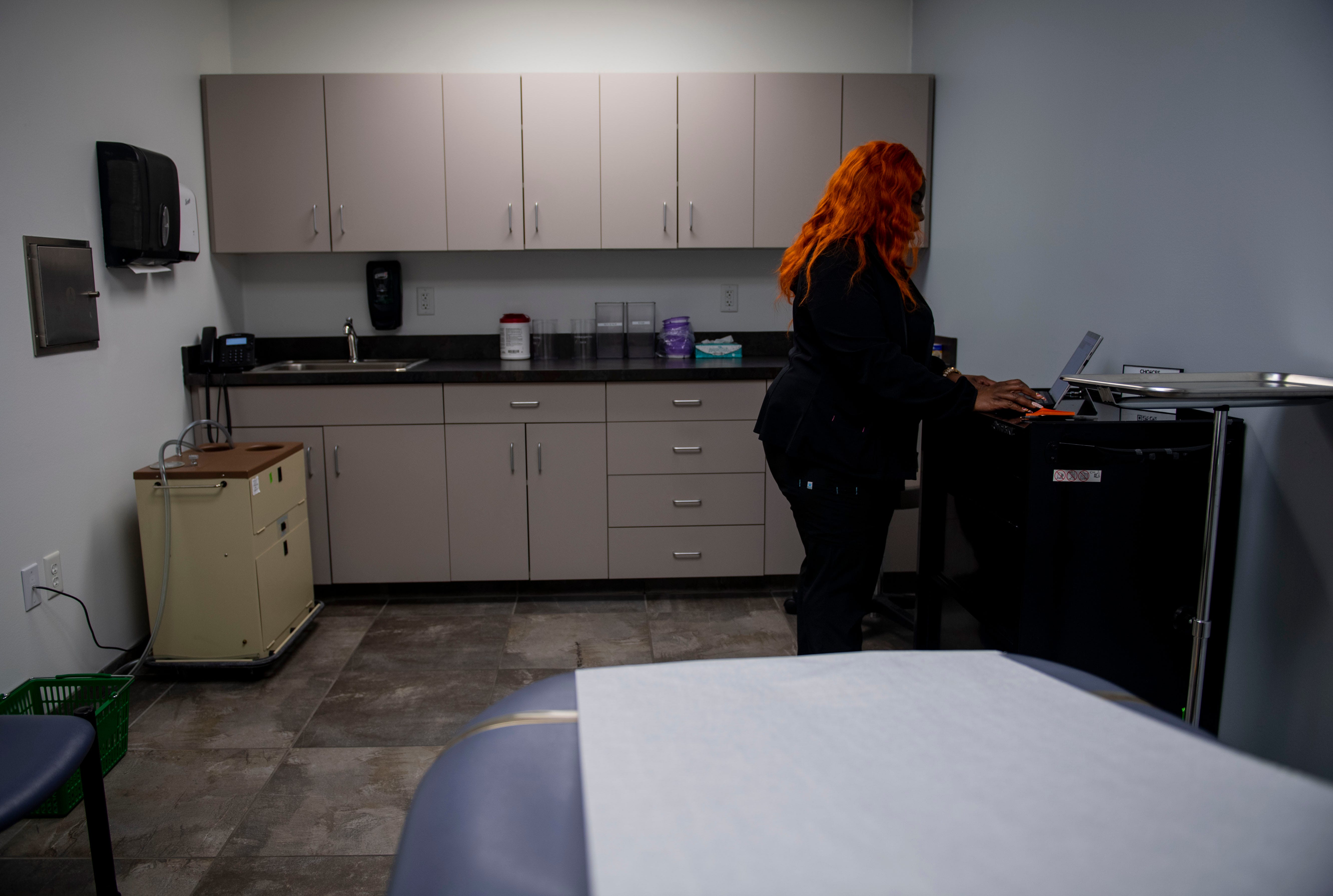
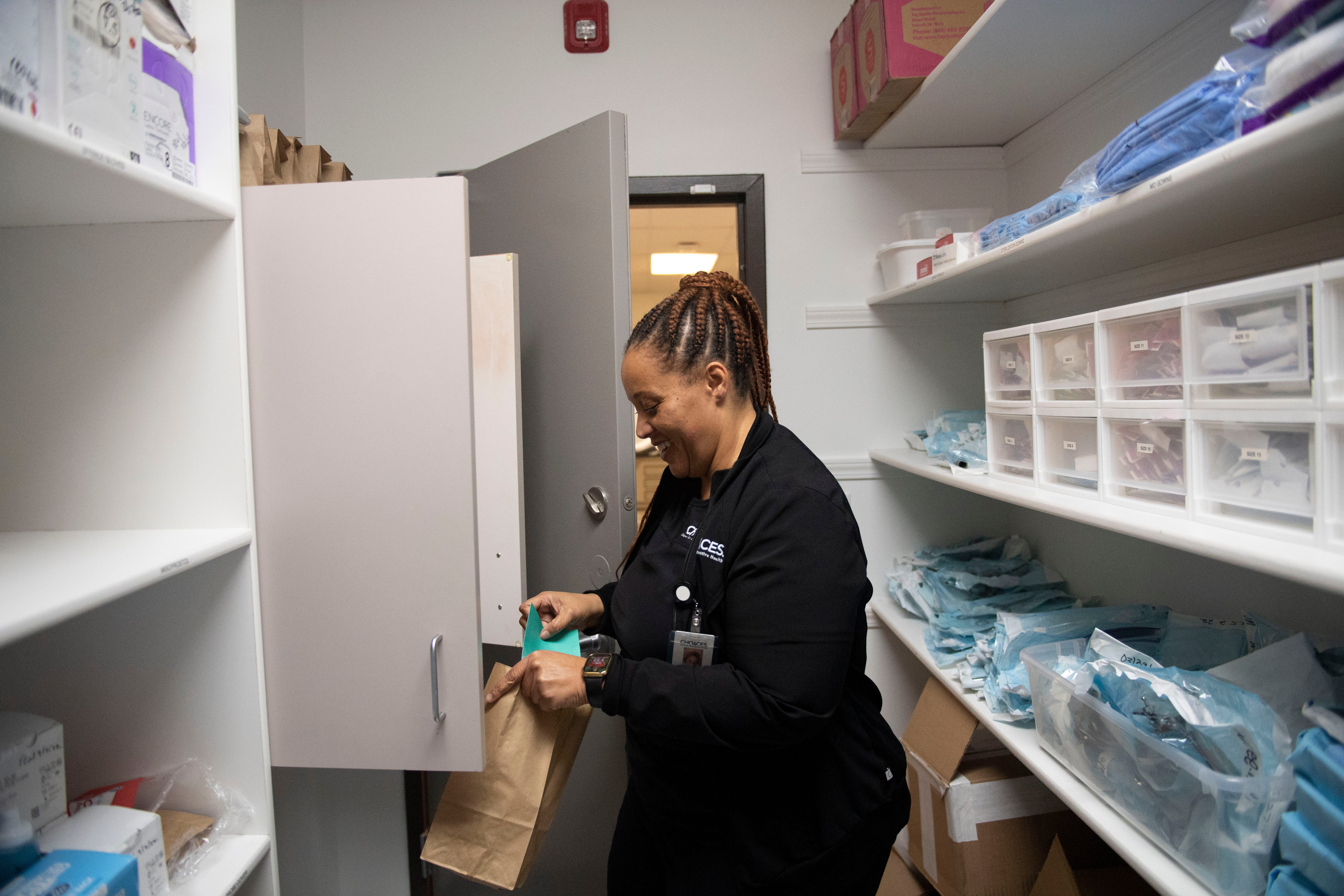
In December, as patients from across the country flowed in and out of Carbondale, employees at Choices Center for Reproductive Health kept up with their system. A whiteboard on one wall tracked each staffer's visit to each waiting patient. NICOLE HESTER, THE TENNESSEAN/USA TODAY NETWORK
Between July and December of 2022, more than 65,000 people were unable to receive a legal abortion in their home state, according to a [FiveThirtyEight analysis](https://fivethirtyeight.com/features/post-dobbs-abortion-access-66000/) of Society of Family Planning data, because of banned or restricted access.
Another [analysis](https://projects.fivethirtyeight.com/abortion-driving-distance/) showed women who lived in a swath stretching from southern Illinois to the Gulf of Mexico faced some of the longest drives for care in the nation.
Illinois is one of the few places where abortion is legal for up to 24 to 26 weeks of pregnancy. Choices performs abortions up to 12 weeks.
In the Carbondale clinic’s exam rooms, women flowed in and out.
In one room was a matter-of-fact, 30-something flight attendant in black boots, who said she was upset she'd had to travel so far, take off work and face protesters who tried to stop her. They had no idea of her reasons, she said. What if she’d been raped?
In another room was a 21-year-old factory worker from Kentucky, a single parent not ready for a second child. She didn’t know much about the abortion debate. Only that she’d looked up where to go and found Carbondale. Her boyfriend waited outside in the car.
In yet another was a young woman in a hoodie and sweatpants. She was nervous and kept an earphone in one ear. She said she wanted to be ready to care for a child.
“I’m barely able to take care of myself,” she said.
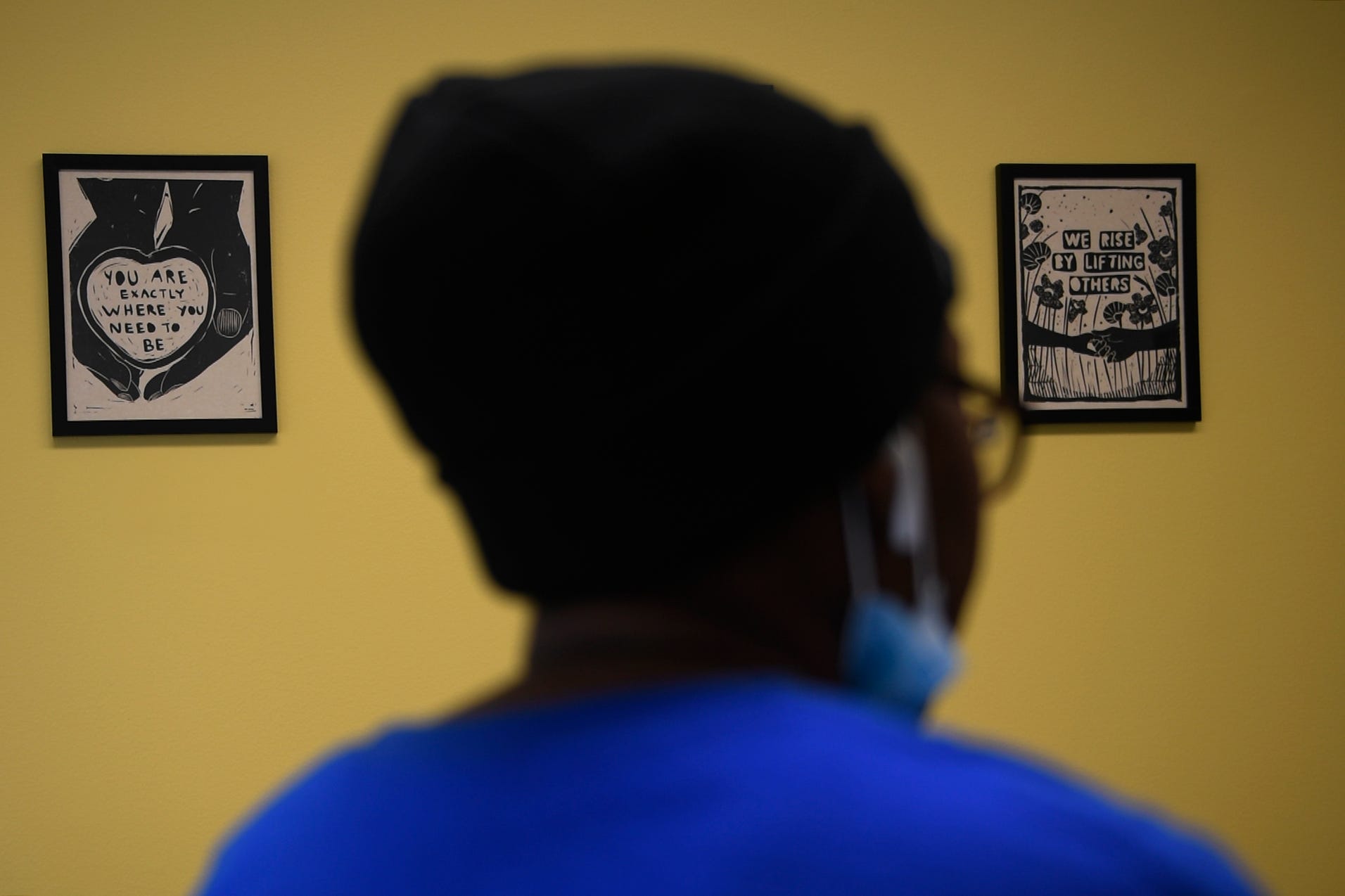
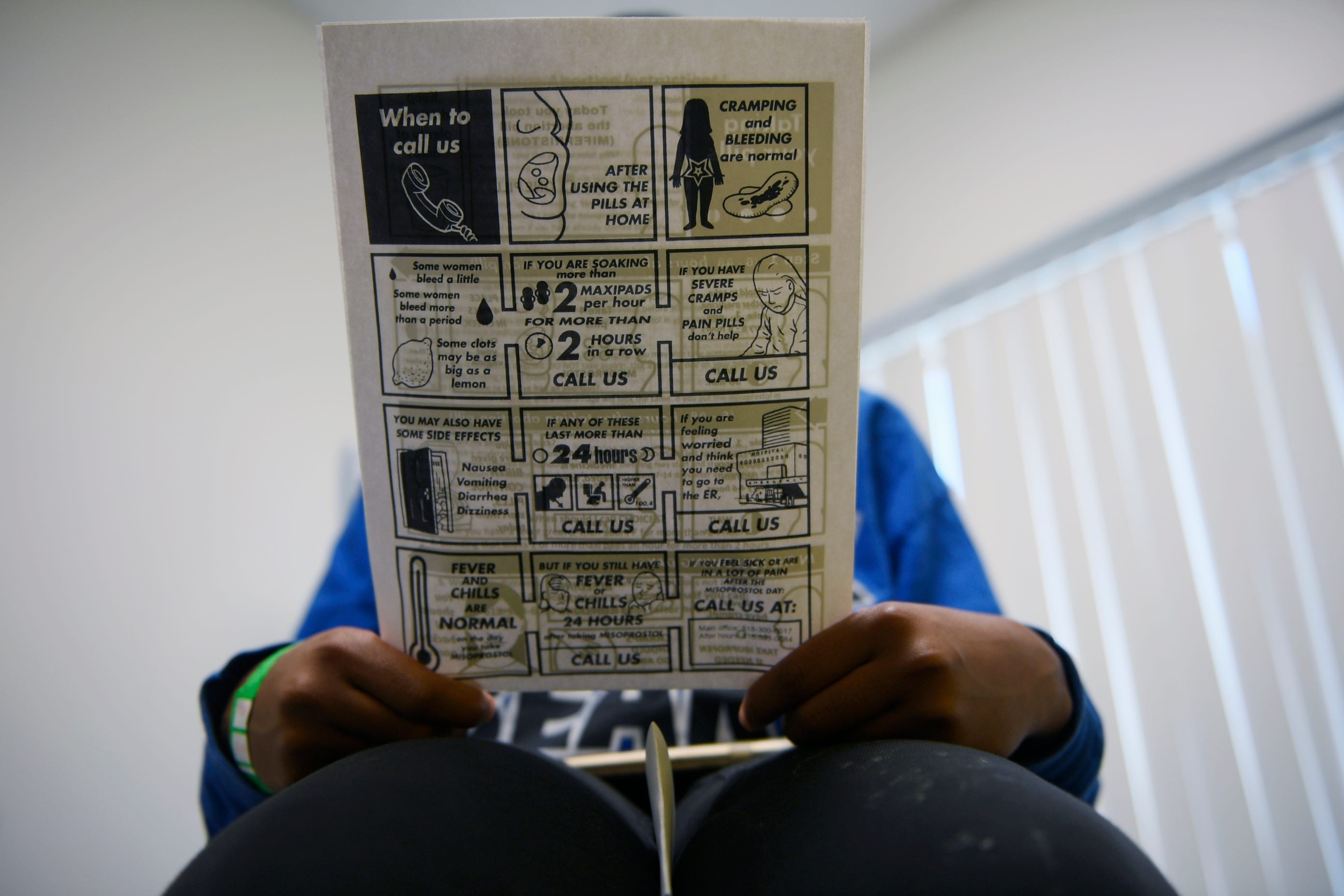
At Choices, the walls are dotted with encouraging artwork. Patient handouts give guidance on what to expect after taking abortion medication. At Choices, the walls are dotted with encouraging artwork. Patient handouts give guidance on what to expect after taking abortion medication. At Choices, the walls are dotted with encouraging artwork. Patient handouts give guidance on what to expect after taking abortion medication. NICOLE HESTER, THE TENNESSEAN/USA TODAY NETWORK
Some women arrived with firm determination, staff said. Some wavered and left. Others let loose a floodgate of tears when they finally reached a sympathetic staffer after a long journey. Staff neither encouraged nor discouraged them – it was their own choice.
In one room, the young woman with a green wristband was upset that protesters had gotten her to stop at a sign that read “Check In.” There, two people she thought were clinic workers with safety vests and clipboards had tried to get her to visit the local pregnancy center for an ultrasound and to persuade her against abortion.
Her decision was anything but blithe, she said.
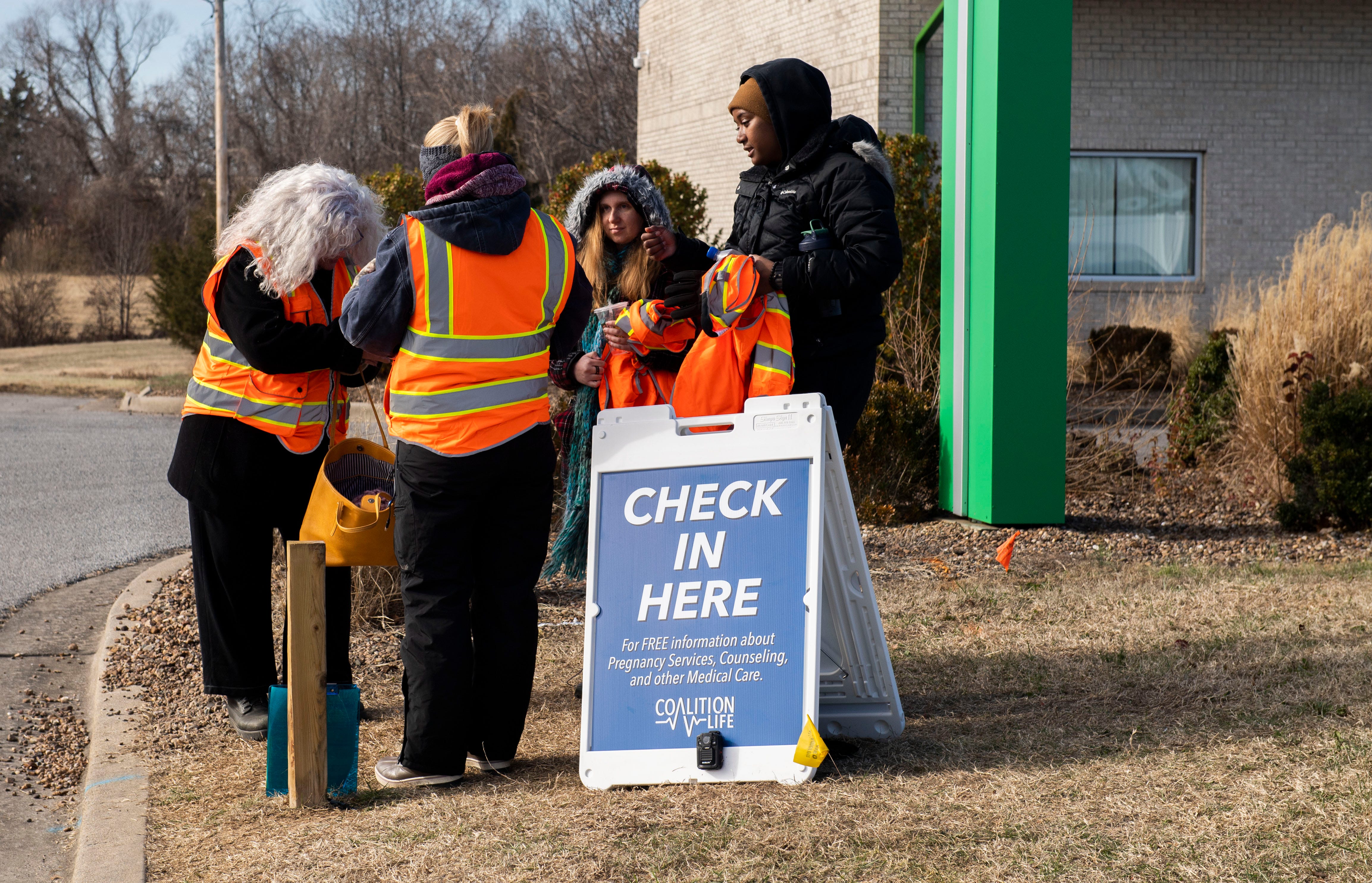
Outside the Choices clinic, people with orange vests and a check-in sign hope to stop arriving women and steer them toward a pregnancy center that encourages alternatives to abortion. Nicole Hester, The Tennessean/ USA TODAY Network
The clinic staff asked her about her period, took her vital signs and medical history. They went over what to expect with the two-drug regimen.
There would be cramping. Bleeding is normal. Watch for blood clots bigger than a lemon, they said. Call if she had concerns. And they stressed that once the pill is taken, there is no turning back.
“So of course you just have to be sure of your decision before you take that pill,” one staffer said.
She was handed the first pill and a small bottle of water.
Not long after, she walked out, past the security guard. She looked exhausted. Back home, her kids were waiting. And there was a long drive ahead.
It was already dark on an early January night in downtown Carbondale as more than a dozen abortion opponents held hands in a prayer circle inside city hall – hoping to persuade the city not to approve a 100-foot “bubble zone” to keep demonstrators away from those entering clinics or any health care facilities.
After taking Communion, they sang hymns and prayed. “Our God, won’t you stop them?” one woman asked. Another person, his head bowed, said, “It’s not your will that children be sacrificed.”
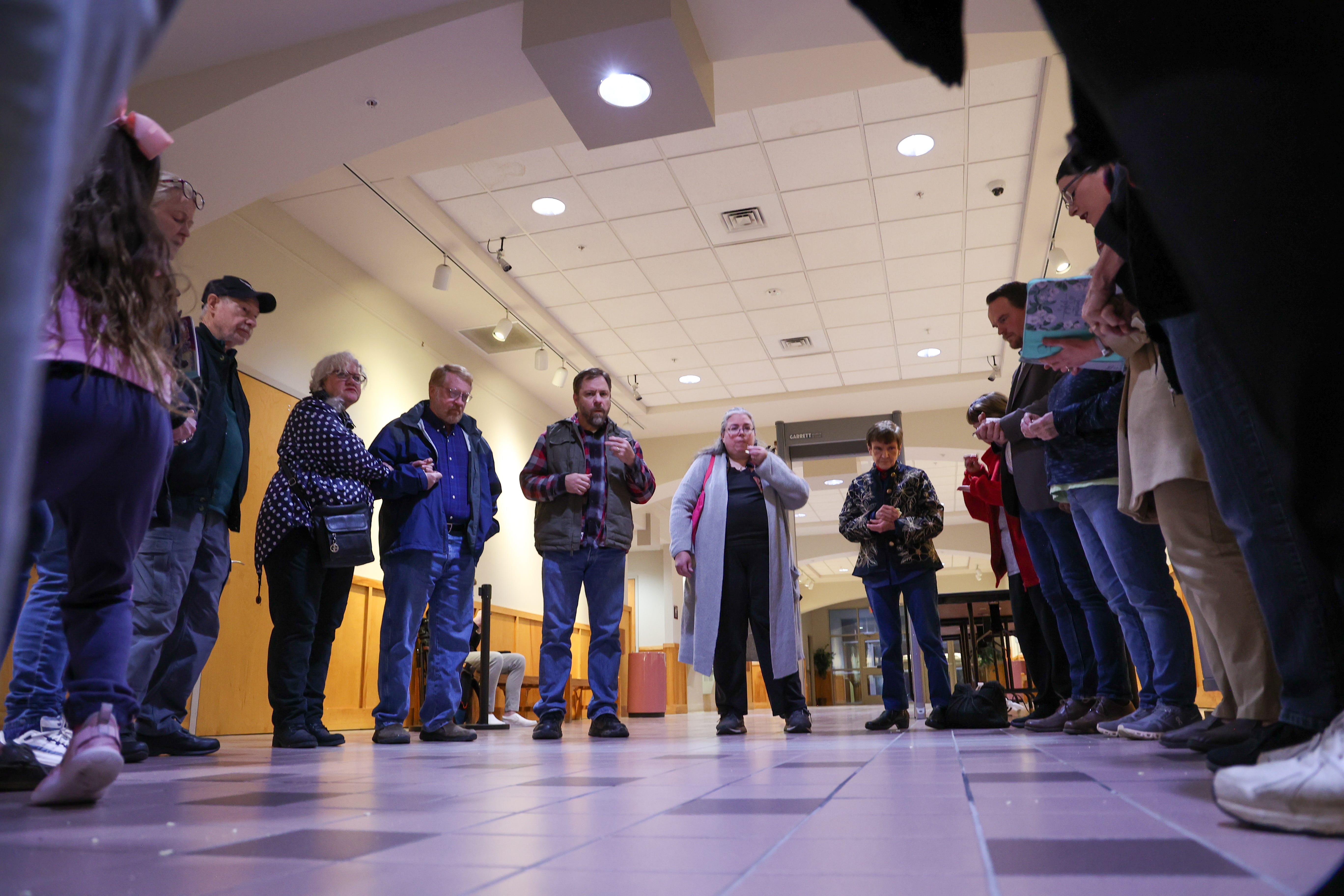
By January, Carbondale was preparing to pass a law to keep protesters farther away from the abortion clinics. A group of activists gathered inside city hall to try to stop the new rule. Chris Kenning, USA TODAY
Watching and shaking her head was a woman who owned a business in Carbondale. She declined to provide her name. But she said the debate had created lingering local tensions.
“It’s a very dark road we’ve come down,” she said.
About 70 opponents, and six supporters, waited through more than an hour of mundane council business: a liquor license dispute, complaints about potholes and whether Carbondale should have new year’s fireworks.
A series of anti-abortion speakers said the "bubble zone" proposal violated their constitutional rights and they threatened legal action. They said the decision was part of a larger question of the city’s identity. Supporters countered that women and clinic workers shouldn’t be bullied.
But some of the more fiery speeches from the previous May, when some opponents had hoped to block the clinics quickly, seemed absent.
And the city council members didn’t budge. One said he didn’t appreciate being threatened with lawsuits. Loos launched into a dressing-down over the tactics including demonstrators’ use of ladders they climbed to peer over Choices’ fence.
“It’s creepy. It’s weird,” he said. “Stop it.”
The council passed the ordinance.
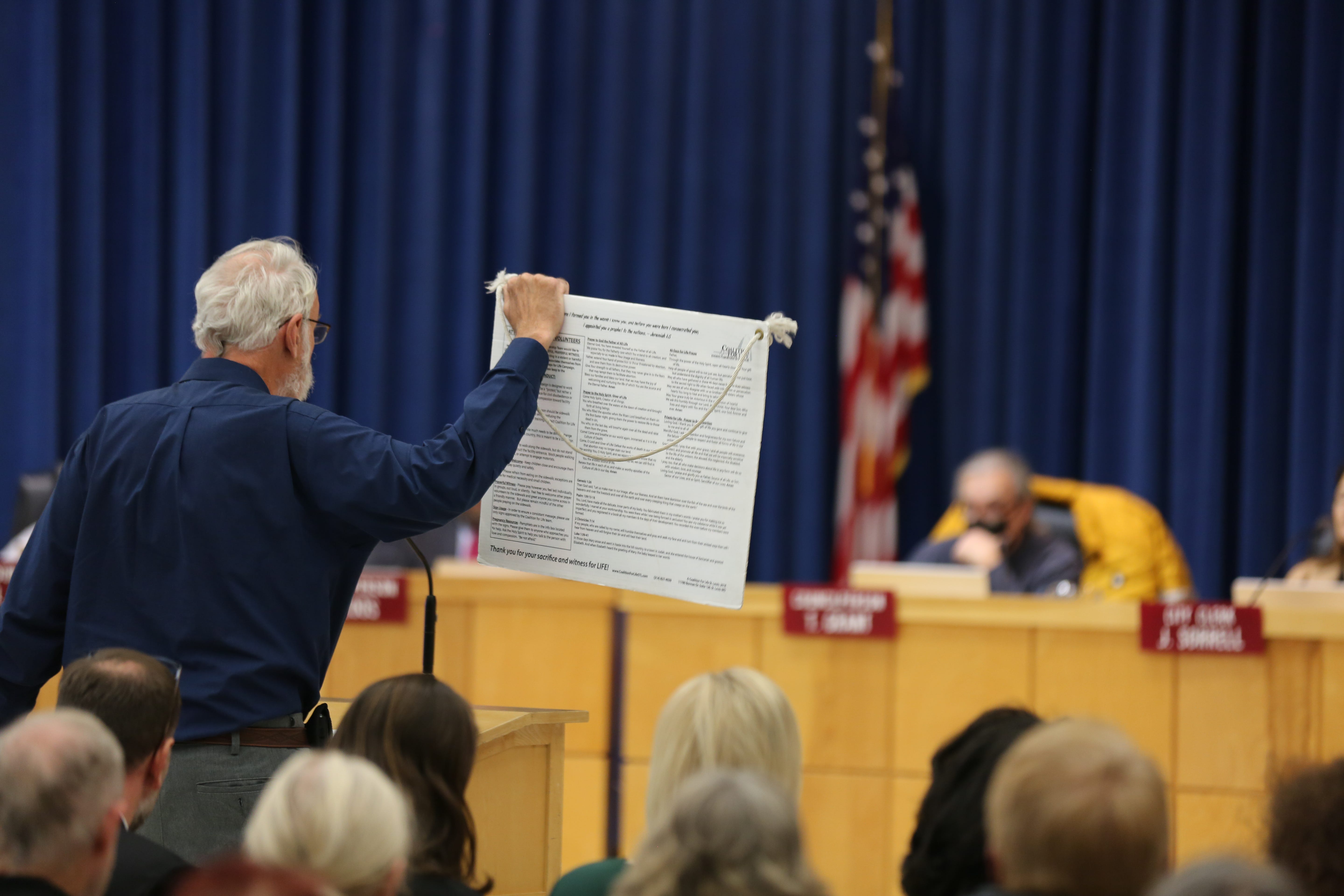
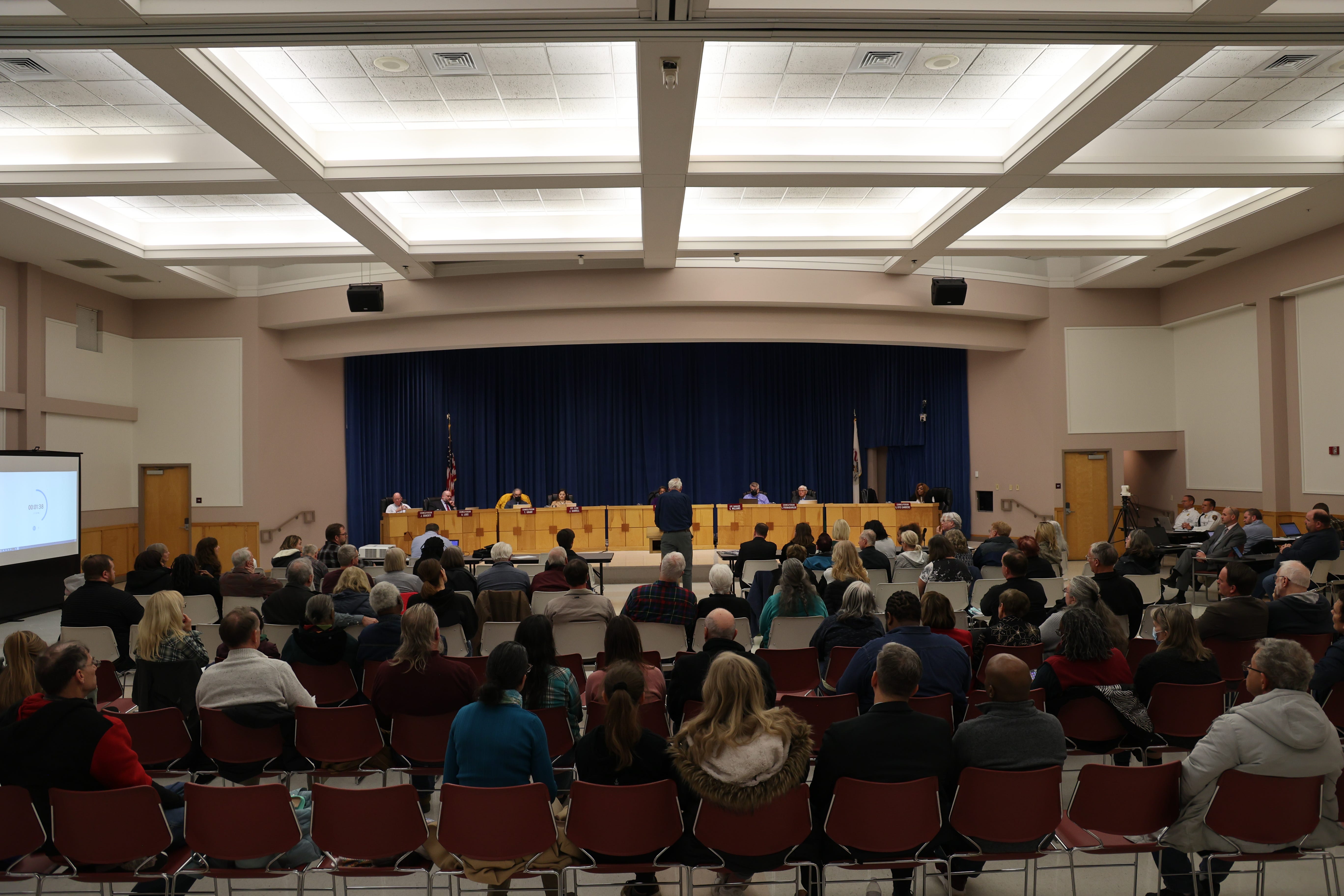
Anti-abortion speakers said the city council's plan for a protest buffer zone violated their constitutional rights. The ordinance passed. Anti-abortion speakers said the city council's plan for a protest buffer zone violated their constitutional rights. The ordinance passed. Anti-abortion speakers said the city council's plan for a protest buffer zone violated their constitutional rights. The ordinance passed. CHRIS KENNING, USA TODAY
Curt Caldwell, a former teacher, had been going out with his wife, Connie, to pray outside the clinics. He said they were disappointed more residents weren’t actively involved.
After the fervor of the initial meetings, they said, some of the enthusiasm seemed to have dissipated. “It just was like, 'Hey, where are they? Where did they go?'” Connie Caldwell said.
“When it’s our town, and then something invasive comes in that you know in your heart is wrong, then it’s hard,” she said.
After the buffer zone passed, clinic staff said they saw a drop in demonstrators. By late March, sometimes there were just a few protesters, if any. Anti-abortion activist Scott Davis, standing with several others one day outside of Alamo's long drive, acknowledged turnout had dipped but said at least a small number of women had been persuaded to go to the pregnancy center.
Carbondale resident Stanley Tucker wrote to the local paper, saying he’d sat in his chair holding a sign reading "Choose Life" or "Protect the Unborn,” and complained about residents passing by and shouting obscenities at protesters.
A local man who opposed the clinics was running for mayor. But opponents knew that what they really needed, to flip the state’s Democratic legislative supermajority, was a tall order.
“Long term, it ultimately ends up being a political thing, because the state legislature is the one that decides these laws,” said Surburg, the pastor.
While that seemed out of reach, he said, so too did overturning Roe v. Wade before it happened.
On a warm day in late April, Cindy Courtney looked over the shelves of diapers, books, baby clothes inside Carbondale’s Cradle of Hope.
The Catholic-supported charity, whose stated goals include “to encourage life and prevent abortions from taking place,” had recently opened near a building under renovation that was widely rumored to become the city’s third clinic.
City officials confirmed a new clinic was set to open this year but wouldn’t say where, and some clinic operators stayed publicly mum about their plans.
“It’s right behind us,” said Courtney, the center’s volunteer director. “My first thought is to stand there and pray, or throw some holy water on it.”
At Cradle of Hope, a Catholic-supported charity, Cindy Courtney stocks baby supplies for needy mothers that it hopes to persuade not to have abortions. She laments how the town became synonymous with the abortion fight. “It just happened so fast,” she said. At Cradle of Hope, a Catholic-supported charity, Cindy Courtney stocks baby supplies for needy mothers that it hopes to persuade not to have abortions. She laments how the town became synonymous with the abortion fight. “It just happened so fast,” she said. At Cradle of Hope, a Catholic-supported charity, Cindy Courtney stocks baby supplies for needy mothers that it hopes to persuade not to have abortions. She laments how the town became synonymous with the abortion fight. “It just happened so fast,” she said. CHRIS KENNING, USA TODAY
In the year since locals first heard clinics were moving into town, Courtney lamented that Carbondale had become so widely associated with abortion. Southern Illinois had even been referenced as an abortion haven in an episode of the ABC show “Grey’s Anatomy.”
“It just happened so fast,” she said. “It wasn’t here. Then all of a sudden, here in a little bit, we’re going to have three abortion clinics.”
By May, after ramping up over months, Alamo and Choices together were scheduling about 20-30 women each day, with 95% from out of state – making Carbondale the emerging haven of access that clinic operators had envisioned more than a year earlier.
Illinois as a whole also saw more and more distant patients amid bans both nearby and in the South. Planned Parenthood of Illinois, which operates in various locations, saw numbers of out-of-state patients rise to 30% from 6%.
“The fact that so many people are traveling daily is pretty incredible and ridiculous, all at the same time,” Gallegos said after climbing into her car after a day at the Alamo clinic. She said she was still working to move her family to a city she said had become an “island of access.”
Elsewhere in Illinois, a new abortion battle was brewing in a small town along the eastern border with Indiana, whose total abortion ban was still being hammered out in court. And months earlier, in Peoria, a man was charged with setting fire to a Planned Parenthood clinic, causing $1 million in damage just days after Illinois passed [legislation aimed at protecting abortion patients and providers](https://apnews.com/article/abortion-us-supreme-court-health-care-costs-illinois-bbc4df0d3bec21ad84febd9ee0f0937d).
Gary Williams, Carbondale city manager
> We’re a little blue dot and this huge sea of red in Southern Illinois. And you’ve got this dynamic of local residents that have been really quiet about it. It hasn’t riled them up, it hasn’t caused a lot of stress. And then you’ve got a lot of dissension and activism and protests from folks who don’t live here.
But even as the Carbondale clinics gained notoriety outside the city, the visible signs of tension that some feared would be a permanent fixture in Carbondale – for the time being, at least– had appeared to ebb.
Clinic protests hadn’t proven as large or disruptive as Williams, the city manager, feared a year earlier after the tumultuous council meetings in Carbondale.
Nor had the clinics faced any major threats of violence. Carbondale police responded to once-weekly calls to remind protesters of property lines, officials said.
A Carbondale anti-abortion mayoral candidate who emerged was defeated in a spring election by Carolin Harvey, who served as mayor-pro-tem after the former mayor stepped down. Other city council members who supported the clinics were reelected.
“It’s been really interesting to see how this whole thing has played out,” said Williams, who viewed Carbondale’s experience with abortion as reflecting the nation’s larger political divides.
“We’re a little blue dot and this huge sea of red in southern Illinois. And you've got this dynamic of local residents that have been really quiet about it. It hasn’t riled them up, it hasn’t caused a lot of stress. And then you’ve got a lot of dissension and activism and protests from folks who don’t live here,” he said.
How area residents viewed the impact of the clinics’ presence – whether it was the talk of the town or a non-issue, a crisis or something that elicited shrugs – tended to be colored by like-minded social circles that rarely intersected.
“I don’t hear any opposition. But that’s because everybody I’m around is in support of the clinics,” said Mays, who explained that she learned that, in Carbondale, “there turned out to be much more pro-life people than I thought there was.”
The Chamber of Commerce hadn’t quantified any economic impact, but some people in town said it likely gave at least some boost to restaurants, gas stations and hotels, at least one of which offered a discount to clinic clients. Nor had any obvious boycotts appeared to materialize.
Still, clinic leaders said protests tended to ebb and flow. And local anti-abortion groups said they would not stop their efforts. By mid-May, Coalition for Life and the conservative Thomas More Society would file a federal lawsuit seeking to overturn the city’s 100-foot buffer zone.
At a news conference in front of city hall, Peter Breen, a Thomas More Society attorney, said the suit represented a renewed push in Carbondale and was part of a broader struggle in a state surrounded by those with stricter abortion rules.
Breen said he was reminded of the complaints he heard from southern Illinois lawmakers when he served in the state legislature.
“What is with you guys in Chicago imposing your values on us here in Carbondale and in southern Illinois?” he said. “Why should these folks here in southern Illinois be turned into an abortion hub for a good third of the country? It’s not right.”
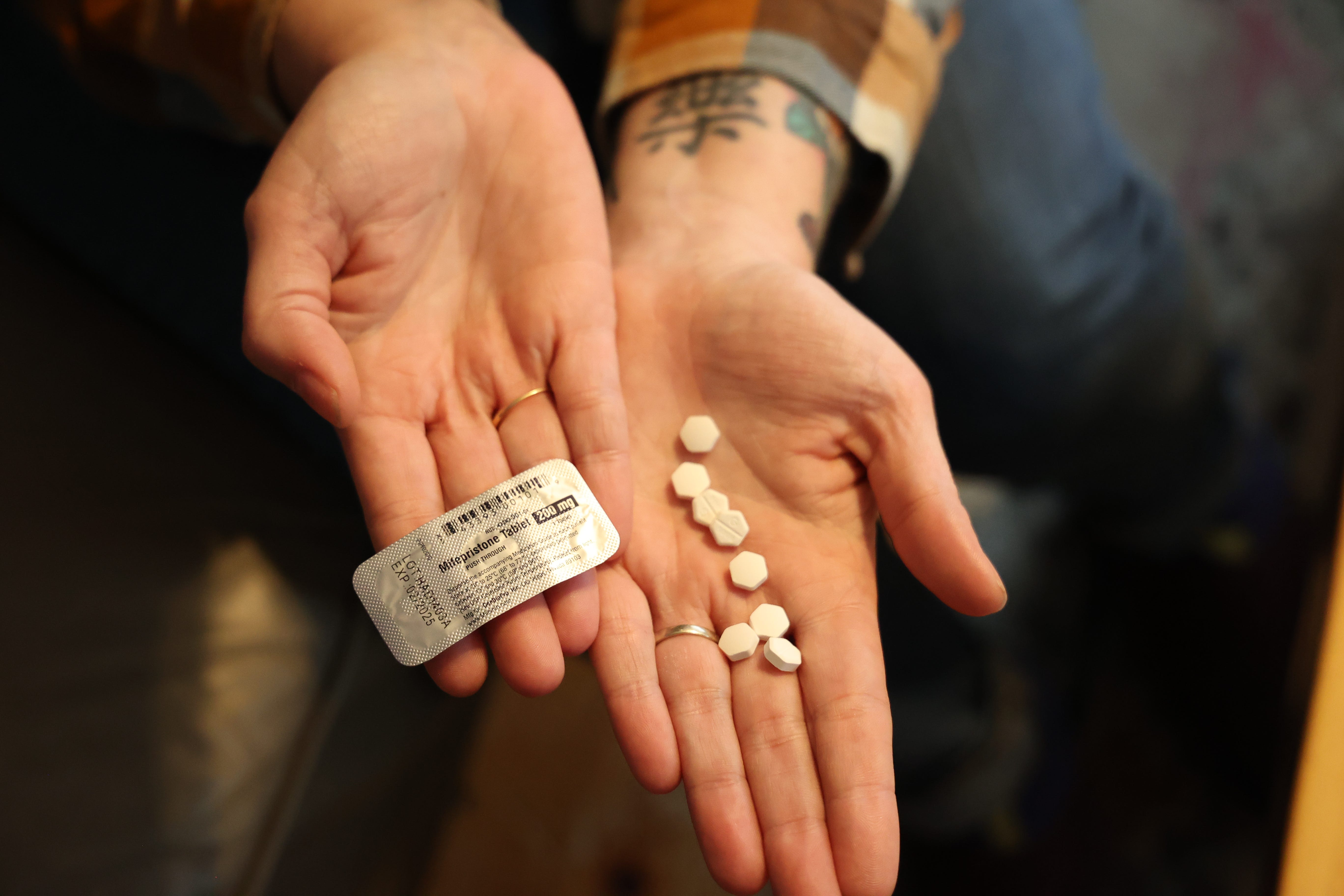
Abortion pills, held by an advocate in Illinois. Chris Kenning, USA TODAY
Across town at Choices, a group of staffers huddled by the front desk one morning near a still-empty waiting room, clicking on computers, preparing exam rooms and making small talk. Their work on the front lines of the abortion fight had grown routine. They got plenty of support – people still regularly stopped by the clinic to make donations or bring cookies or flowers – despite an occasional dirty look.
“I think Carbondale has been a very different experience from other new clinics opening in smaller communities or along borders,” Pepper said.
By the end of March, in the first five and a half months they were open, Choices had performed just over 1,400 abortions, reaching an average of about 400 a month, the largest numbers of women coming from Tennessee, Mississippi and Arkansas.
Though rising each month, it’s just 75% of the surge that Pepper predicted – likely a function of the newness of the location, greater use of abortion pills via telemedicine, unpredicted preservation of abortion access in some states and the struggle to reach distant clinics, she said.
Jennifer Pepper, president and CEO of Choices Center for Reproductive Health
> I think travel is an even bigger barrier for people than we had anticipated. Probably lots of people are choosing to continue their pregnancy because a place like Carbondale just seems like too high a hurdle to jump, especially for people living in poverty in southern Mississippi or southern Louisiana. That’s a long way.
“I think travel is an even bigger barrier for people than we had anticipated,” she said. “Probably lots of people are choosing to continue their pregnancy because a place like Carbondale just seems like too high a hurdle to jump, especially for people living in poverty in southern Mississippi or southern Louisiana. That’s a long way.”
For Pepper personally, it’s been a long 18 months since first setting her sights on Carbondale – one full of fundraising, long commutes, media attention, hiring local staff, navigating city leaders and protesters and serving as a public advocate.
“It was incredibly stressful. I probably spent more nights in hotels and Airbnbs than I did at home,” she said. “And quite frankly, what makes me even more tired is that I don't see it slowing down for us, for our patients, for our communities, anytime soon. Especially with all the additional attacks on medication, abortion and gender-affirming care. It feels like drinking out of a firehose.”
To Pepper, the meager showing of daily protesters outside the clinic's windows was a reminder of public attitudes often lost amid heated fights over abortion.
“Most people in this country, and even in very red areas, support access to abortion,” she said, citing polls that show 61% say it should be legal in all or most cases, something that helped fuel a midterm election backlash to the high court ruling.
Yet as the one-year mark approached, legislatures in Florida and North Carolina continued pushing [moves to further limit abortions](https://www.usatoday.com/story/news/nation/2023/05/16/north-carolina-12-week-abortion-override-governors-veto/70226030007/), and courts weighed the use of the pill mifepristone. The battles over abortion rights continued.
So too did the demand for abortion – and the work of those determined to provide it.
At Choices, it could be seen in the flickering appointment screens.
The cars with out-of-state plates in the parking lot.
And the exam-room whiteboard that is checked, erased and checked again.